#there are about four responses people have to trauma 'flight fight freeze and fawn'
Explore tagged Tumblr posts
Text
Iwtv s2 ep 2 spoilers / mini meta
Since I haven't seen anyone mention it yet, the scene where louis was discussing Lestats will and testament with Daniel, he seems to begin having an anxiety attack, that's why he lashes out at Daniel.
I thought it was pretty obvious, but also I suffer with anxiety and have aggressive responses, so maybe not everyone knows this.
#im guessing louis has pretty severe ptsd and the show has made that clear#so when he starts pulling up bad memories of daniels he's doing a 'fight' response#there are about four responses people have to trauma 'flight fight freeze and fawn'#daniel was triggering him and so louis responded trying to emotional cut him. ive been in his shoes before. not the exact same situation but#saying something to hurt someone because they triggered you#iwtv#iwtv season 2#louis de pointe du lac
6 notes
·
View notes
Text
The Insidious Cycle of the Abuser Who Says They Love You: Mythal and Solas
Likely goes without saying, but Veilguard spoilers all under the jump.
I have been absolutely wrecked by the end scenes in Veilguard for weeks now, and I want to do a deep dive into Solas's relationship with Mythal and how it absolutely reeks of abuse. Long post incoming!
CW for heavy discussion of cycles of abuse, trauma response, and abuse tactics.

When I finished my first playthrough, this moment hit me like an absolute freight train. His visceral response to her presence and the way he instinctively retreats and flinches back/puts out a hand to protect himself is a full-blown trauma response.
And then she starts talking and moving towards him, and it gets worse.
Solas curls in on himself; his body goes even further into self-protection mode. His face is downcast, not the way he bowed to his vhenan moments before with a straight back and open posture, but shrinking.

And then as she advances, he cowers.

He completely folds inward. He crumples; he shakes, he hyperventilates, and the moment she reaches for him, he fumblingly offers her the lyrium dagger to kill him with.
Is this shame? Yes, of course, but it's far, far more than that.
For the sake of brevity, I'm going to limit this list to the four most widely recognised trauma responses:
Fight
Flight
Freeze
Fawn
As someone whose primary trauma response is fawn (wooo CPTSD), which is intensely common among people who experience complex trauma, especially through emotional and prolonged physical/mental abuse where their needs are discarded, pushed aside, or otherwise steamrolled, I felt this right alongside Solas. My own body responded to seeing it. This is, quite frankly, one of the most visceral and realistic (and extreme) fawn responses I've seen depicted in media.
Mythal in this scene is...phew, something else.
"She was the best of them," Solas tells us in Trespasser.
But she was not good, everything tells us in Veilguard.
Let's look at his regrets in chronological order.

Through Solas's memories of regret, we see this germinate in his foundational regret: leaving the Fade to take a physical form.
He does not want to do this. He tells her he does not want to do this. From the conversation, it's clear it's not the first time she's asked.
And the way she asks? Outright coercion.
"You have so long observed the world. Why not consider joining it?" [I want you to do this thing, so I will frame it as logical for you to make the choice I want you to make.]
"But I have no desire to live as humans. Besides, this talk of taking on a solid form. I think you underestimate the danger." [I don't want to do that. It does not feel safe to me.] "When you took the glowing stone to build your body, did the earth not shake?" [This is dangerous and selfish.]
"The lyrium gives us the strength we had when we were of the Fade; we are the best of both physical and Fade." [It makes us powerful, so I don't care about the risks.] "I need your wisdom, Solas, to withstand the louder voices like Elgar'nan's who would go too far." [If you do not come with me, a tyrant you abhor will make others suffer.] "I need you."
"This is madness. You must know that." [I don't want to do this at all. This will hurt me. I don't want this.] "I will always follow where you go." [Because I love you and trust you.]
Mythal's words in this part are classic abusive framing. When appealing to his natural curiosity does not work and he expresses strong rejection of her logical thought process (just because I have observed this place does not mean I want to go there, echoing his comments to the Inquisitor in DAI: "Many Orlesian peasants dream of travelling to exotic Rivain. But not everyone wants to go to Rivain!") and expresses that there is significant danger to continue to build bodies out of lyrium, she changes tactics.
Her second tactic is that it gives them power--she implies that he is limited and not enough for being only of the Fade. If he follows her, he will be the best of both, like she is. She clearly already sees herself as above him.
Her third tactic is pure emotional blackmail: "I need you. I will give in to the tyrants without your wisdom, and having your counsel in the Fade is not enough. If you don't go against your own nature and desires, people will suffer...and it will be your fault for not being by my side."
She doesn't say those things outright, but they are implied by everything she is saying. He says again he doesn't want it--that it is madness and that she must be aware of that despite her ignoring any suggestion that she actually is. All she is seeing is power and her desires: for Solas to do what she wants him to do.
So he agrees. Because she is his friend, and she says she needs him.
As far as core wounds go, this one is a doozy. It's absolutely brutal, because it's irrevocable. It's a point of no return. It's the first in what will become millennia of regret, of her ignoring the Wisdom she coerced out of the Fade to do what she wants regardless, to continue to push him to twist his nature under the guise of the greater good, to continue to cede to Elgar'nan and enable the very tyrants she promised him to balance.
This regret was deeply painful for me to watch. The nuance here is easily lost if people don't understand abuse tactics and how this sort of manipulation is used. It also serves to bind Solas to Mythal, an enormous sunk cost fallacy in the making--once he has made this choice, there is no going back.
And you see Solas curled in on himself in anguish and regret from the trauma of taking a physical form. It is in deep, painful contrast to his open, free wingspan as a spirit of Wisdom; he will never be the same.

"Have you created what we need?" From the outset Mythal is framing this as his idea as much as hers, when from everything he says, that is not true.
"With this, the proper ritual will sunder every Titan from its spirit. But you must know, those severed dreams will certainly be driven mad, a disembodied blight of pain and anger. It--is--awful what we are doing."
"And the only way to end this war."
Again, Solas offers the wisdom she claimed she took him from the Fade to listen to. He warns her, again, of the danger. He does not want to do this. Just like he warned her of the earth quaking when they made their bodies--they, the Evanuris, started this war by taking what they wanted regardless of who it hurt. He never wanted to participate in it, but now he is in the middle of that war. Mythal was one of the initial perpetrators of this war; she brought Solas into it against his will because he loved her, and now he's stuck. He is past his point of no return. And she is still using his heart against him. She has isolated him from everyone he knew in the Fade; he has no one to support him. He. Only. Has. Her.
This is another classic abuse tactic; if the person being abused has no one else, they will continue to enable that abuse even if it harms others, because they cannot see a way out. If you don't do what I say, it will destroy our children, our family. If you don't do what I say, this war will consume all you have, and you no longer have a home to return to. If you don't do what I say and hurt yourself and the Other, more will suffer, and it will be your fault.
Again, his posture, curled up and broken, appearing to cradle a now-tranquil Titan beneath him--and be embraced in return. This is an interesting artistic choice here, one that aches. It speaks to the depth of his own wound and how much it rent his own spirit to follow through with Mythal's wants here; that it sundered him from his spirit as much as it did the Titans.

"You cannot do this, Elgar'nan! You swore we would give up our commands when this war was over!"
"Our people need our leadership. If you are unwilling, leave."
From Elgar'nan, this is expected. From Mythal?
"Our people must rebuild. And we must help unite them."
Solas, once again, betrayed. He put his trust in Mythal and in the other Evanuris to follow through with their promise. Everything he has done thus far is poisoned in this moment; had the Evanuris indeed stepped back rather than stepped on necks, perhaps Solas could have healed, found a way to live with what he had done, maybe even to make amends. But this starts his war anew--and Mythal is standing with his enemy despite her promises, despite every wheedling word she's used to get what she wants from him over the centuries and longer, despite him turning from everything, everything, he loved to love her. This is the moment where he understands that he has only been a tool to her all along.
"So we did not fight for freedom, but to conquer this land and our own."
Let's pick apart Solas's words.
So we did not fight for freedom: He truly believed that he was fighting for freedom, that no matter how bad it got, that he could bear it for freedom.
But to conquer this land: Literally the land, I think, because of the Titans. To subdue them at all costs. This was not what he came for, but he believed Mythal.
And our own: Our own, our people, more spirits we gave bodies for this war, more who may not have wanted to leave the Fade. Our own, our people. To Solas, he is one of them. In this moment, he realises how much Mythal holds herself above all of them.
Elgar'nan's words are all too telling: "We fought to win. And now the Evanuris are as gods. I do not answer to Mythal's annoying lapdog."
They all--all--see him thus. As her pet.
Because he is. She has, until now, controlled him utterly with her manipulation and "need" for him.
"The people are afraid. They must believe in something." Mythal does not even stand up for Solas here; she does not reject Elgar'nan's perception of him. All she does is further distance herself.
The people are afraid: The Evanuris made them. They are as controlled as Solas and more.
Elgar'nan asserts, "They need strength."
"And wisdom." Mythal has the absolute gall to attribute this to herself, when Solas is the source of the wisdom she "needed" for so long. (Belated addition: And another level here: she may also be saying again that she needs him, but doing so in a way that doesn't require her to stand up for him directly. Honestly, fucking gross.)
"They need gods who can protect them," Elgar'nan continues.
"We are not gods. You will learn that." Solas's voice here is pure defeat. The scales are falling from his eyes.
"Every lapdog holds a wolf inside," says Elgar'nan.
Solas knows that Elgar'nan's "protection" is hollow, based on subjugation. And I think in this moment, he learns that Mythal's is based only in her belief that she is better than those beneath her, who cannot possibly handle themselves.
So her lapdog becomes the Wolf.

"I was not certain you would come."
Solas's opening words in this regret show the distance between them already and how much he has realised he does not know this woman who called herself his friend.
And her response is to instantly blame him.
"You are the one who walked away. I never turn my back when my friend needs me."
In putting this post together, this line absolutely sucker punched me. I've watched these several times already, but the absolute audacity to blame him for standing up for his principles for the first time against all her manipulation? Hoo.
She blames him for doing just that, "turning his back when his friend needed him." She needed her enabler, and when he stopped, she turned bitter. Just like any abuser.
That he goes straight into "The Evanuris seek the magic of the Blight" instead of engaging, honestly shows that he's still Wisdom. That is one battle that is unwinnable, trying to stand up against an abuser's bullshit like that.
"Impossible," she says. "The Blight is safely sealed away forever."
Gaslight, girl boss, gatekeep.
"Though I wish I could believe you." [You have lied to me so many times.] "I have sensed the breaking of the wards."
And her answer is patronising. "I will investigate your claims." [I don't believe you.] "If they forget the danger of the Blight, I will endeavour to remind them."
Solas knows this is futile. "What if, instead, you left the Evanuris and remained with me? Do you not wish for freedom from this struggle?"
He asks her, again, to veer from the dangerous path. He desperately wants to believe he was not completely wrong about her, I think. If she were to leave, he could heal somewhat, for not having so thoroughly misjudged her character.
Am I enough for you? Was I ever enough? is the unspoken question here when he asks if she will remain with him.
And in return, he gets back even more patronising bullshit and hubris. "Be at peace, love. I will stop them."
(Can you tell Mythal pisses me off?)
She calls him love. What an unbearable insult after everything, to go on telling him she cares for him whilst ignoring his wisdom--the very wisdom she coerced him into leaving the Fade so she would have by her side--and consolidating her own power at the expense of his people.
"As you must," he says. "The Blight is our mistake."
Might be unpopular, but I do not think Solas bears a split fifty-fifty custody for whose fault the Blight is. Could he have said no about the dagger? Could he have pushed then? Maybe. But by this point, he'd already had probable millennia of complex trauma and a deeply abusive codependent relationship, probably also a level of magical bond. Like, sorry, Trick and BioWare, if you want to retcon everything you shared with us in Inquisition about being in service to the Evanuris ("You have given yourself into the service of an ancient elven god! You are Mythal's creature now. Everything you do, whether you know it or not, will be for her.") AND Mythal casually overriding her servants' will and Solas burning her vallaslin off his face and leaving a scar and devoting himself to freeing the elven people from the Evanuris's domination, fine, but I don't buy it. Even if there was no magical compulsion on him all this time, that is immaterial.
Complex trauma literally rewires the brain to survive. She spent lifetimes programming him, isolating him, stripping from him every bit of agency he had. This man did not have the capacity to say no.
When our no is trampled even for a few months or years, we stop trying to use it. We comply. We, as mortal humans, cannot begin to comprehend the compounded trauma of millennia of this happening with the stakes of worlds in the balance. Solas, quite simply, has lost the entire ability to consent. No one of us can even imagine.
Yet he managed to walk away from her somehow, when she chose Elgar'nan. This man is stronger than anyone gives him credit for.
The dagger was clearly Mythal's idea. The plan to sever the Titans from their dreams, clearly her idea. To end the war. For there to be "peace". For there to be "freedom". Except that never came.
His loyalty was to her and to their people; hers was only ever to herself.
And again, she walks away and lets Solas suffer.
What a good friend.
[screaming from the general direction of Scotland]

She put her trust in monsters instead of her oldest friend, and the monsters ate her face.
Anyone surprised? I'm surprised. (I'm not surprised.)
And on top of this, Mythal finally, finally giving Solas one tiny breadcrumb that she had any principles remaining? I think that cemented his bindings to her forever. Not just that the Evanuris killed her, but why they killed her: because after millennia, she listened to him.
For someone that deep into trauma and abuse? Well. We know what happened.
It cannot be overstated that with his imprisonment of the Evanuris and the Blight, Solas saved the entire world. The entire world. Every living being in Thedas had a chance at life because of him. Only because of him.
Morrigan says it early on in the game, that for all the consequences of the veil (which, it also must be said, was not supposed to be global!), "his imprisonment of the Evanuris was just. Had he not done so, all of Thedas would have fallen to the Blight."
And the world has hated him for it.
He woke after sleeping for millennia, exhausted by this immense act of magic, to discover that not only had it gone horribly wrong, but that it had cost his people everything. That Tevinter had come in and enslaved them, released a trickle of the Blight after breaking into the Black City, used so much blood magic that the veil itself all over Thedas has been in tatters--not least because in releasing the Blight, the survivors had had to face down and kill the dragon thralls (archdemons) of the Evanuris, rendering five out of seven of them mortal, and with their deaths over the intervening centuries, the veil had grown threadbare with only two Evanuris sustaining it.
The risks were catastrophic, the price unbearable.
Everything he'd ever done to protect the world could still come crashing down...and in a sick twist of fate, he would be alive to see it.
And, shockingly, so would Mythal.

Mythal, whose fragment has just been chilling in a swamp for centuries in human form. Mythal, whose abuse of him lasted through the entirety of the world's history. Mythal, who, due to the Evanuris's betrayal and her abusee's abandonment, has become little more than retribution.
Mythal, who could have set him free at any point in all this time and didn't, because he was hers.
Mythal, who is the only remaining person with the power to do what he feels must be done.
I find it interesting that they chose not to use the post-Inquisition dialogue at all. Interesting also that they used Mythal's voice actor and not Flemeth's. This feels like a retcon, but we'll go with it. Whatevs.
"I knew that you would find me soon enough. You need the power of a god, the strength that I alone still carry."
She's still asserting her own godhood.
He's not having it. "The blighted Evanuris will soon break free from their prison. I must make a stronger one that can contain them."
He's not wrong. Not even a little bit wrong. And he's also right that she won't help him. Why would she? She never has.
"While the prison is important, it is not the only goal you seek."
"Why should I not tear down the veil? And bring back immortality to all the elven people? They deserve it."
And this is where I get even more raging, because Mythal's answer is this: "The elven people of today do not deserve to see the world they love torn apart to salve your conscience."
I'm sorry, what?
The world they love? The world that has offered them nowt but literal genocide for thousands of years? The world where in Tevinter, they're chattel slaves and worse, fuel for blood magic without a thought? The world where in the "civilised", slaveless nations to the south, they're either confined to alienages and subjected to repeated genocide (that's what a "purge" is, if anyone isn't clear on that) or the remnants of the Dales, who are the descendents of another enormous genocide? The world where elven magic has been pillaged but elven mages in human settlements are confined to Circles and abused or made tranquil or also genocided by Templars invoking the Rite of Annulment? The world where they're called "elf savage" and "rabbit" and "knife ear" and cannot participate in Thedosian religious life because the Chantry erases every instance of elves from even the Chant of Light? The world where it took the Inquisitor installing a perpetrator of genocide on the Orlesian throne (both Celene AND Gaspard fit this bill) and either having Celene reconcile with Briala (Briala and Celene's relationship could be a whole other post. Boak.) and blackmailing them to give a single elf lands and a title? That world????
What the fuck, Mythal, die faster.
I got real mad there for a second. I'm fine. I'm fine!
Solas, once more, simply says, "I must fix what I have broken. I am sorry."
More than she deserves, frankly. Man's a mess, but at least he tries. She's been chilling in a swamp and pulling puppet strings for ages and abusing her kids. Nudging history like it's some sort of hobby, because it has always just been pieces on a board to her. They have never been people in her eyes like they are in his.
"As am I, old friend."
Aye, get tae fuck. Friends don't treat friends the way you treated Solas. The closest thing to an apology Solas will ever get from her is that she pretty much just lies down and dies when he comes to kill her. And she still won't set him free before he does. Has to continue to twist her own knife.
This scene has me riled.
And this takes us back to the beginning of this post.
To her essence showing up to release him from her service.
In what is, to me, the least accountable, bare minimum non-apology (she never actually says she's sorry) I've had the displeasure to witness in a videogame, with Solas literally cowering before her and offering her a knife to kill him with since this is the first time he's seen her actual, non-Flemythal face since she died.
This was never a friendship of equals. Ever.
She got one thing right. She did break him. But she knew it all this time, and she never took a single step to put it right until pushed. Her corner of the Crossroads, which he built for her in the desperate hope that she would show a glimmer of the friend he believed she was, notably has a pair of wolf statues. Both beheaded.
She's spent all this time punishing him further.
He never went to visit her? I wouldn't either. I could not blame him.
This has gone to an angry place. So let's conclude with what is, I think, the entire point.
Grace.

"I lied. I betrayed you."
"I forgive you."

Has anyone--anyone--in all his long life, ever said those words to him?
I'll say that again: has anyone--ANYONE--in all his millennia of existence, EVER said those words to him?
I forgive you.
Mythal certainly didn't.
The world certainly didn't.
He has shouldered all the blame of an entire pantheon, a war that broke the world, a blight, everything, always, and while people have come alongside him to help him, I am not sure anyone (certainly not anyone he cares about) has given him the grace of forgiveness.
The beauty of this final scene for me wasn't just Ilaana, wasn't just Ilaana reuniting with the man she has loved for a decade who has spent all that time pushing her away so he couldn't--in his mind--inevitably poison the love of the only person who has seen his spirit and cherished it without twisting him.
It was the slow realisation that Rook trusted his love enough to try.
It was Morrigan, who carries all Mythal's memories and her own of Flemythal's abuse and machinations, who responds to Rook's question about her views of Solas with: "Or do you mean to discover if I would stand directly against the Dread Wolf, were there a need? I shall aid you in any way but that. What has passed between Solas and Mythal...I beg you: do not ask this of me again."
Morrigan knows. She will not raise a hand against him. She will not try to stop him. She will let the veil fall. She will not fight with Rook. Because she knows this being whose memories she holds has harmed him enough.
Solas, in these final moments, even before Mythal shows up to gut punch him, realises all these people have somehow, somehow, banded together to help him.
Not work for him.
Not be his agents.
Not worship him.
Not follow him blindly.
To help him. To help Solas. To help him, after all this time, take the first steps towards himself. Towards his own essence, so long twisted into something he never sought or wanted.
The Inquisitor and Morrigan certainly understand what it's like to be seen only as the symbol others raise in your image. Rook will learn that someday, but is still naive.
But even with that naivete, willing. Present. Able to put aside being a chess piece on his board. Able to see that they would never have succeeded without his help. Able to trust two people who know him better than they ever will.
Able to offer him grace.
And when they produce Mythal's essence, how that must brutalise him; to think that perhaps all this has been to let his abuser kill him back. He clearly thinks that's what's happening. He breaks. He fawns. He offers her the blade that has caused so much pain.
Her release of him is the bare minimum she owes him. I've already railed about that.
What is transcendent here, transformative--it is the mortals.
The mortals offering grace to a god who never wanted to be a god.
It's them together showing him a way out of an endless cycle of trauma and abuse. No one of them alone is enough. Without Rook, they wouldn't have Mythal's essence; Morrigan can't go get it, and she can't do what is needed because she's not actually Mythal, only has her memories. Without Morrigan, who can stand there with those memories but from the compassionate perspective of someone who has watched them in horror from the outside. She's far from objective, but she can do this one thing to help.
Without the Inquisitor (romanced or not, still someone he let know him as he most desperately wanted to be known--the Fade-walker, the Dreamer, the humble mage who desperately needed a friend). The Inquisitor, who kneels before him to comfort him. Who sees his hurt and responds.
If romanced, without Lavellan, who kneels to repeat back words he once shouted at the Nightmare in the Fade after Adamant.
"Dirth ma, harellan. Ma banal enasalin. Mar solas ema mar din." (Speak, traitor. Your victory was fruitless. Your pride gives way only to your death.)
To which Solas replied, "Banal nadas."
On the surface, nothing is inevitable, but can also be taken to mean that nothingness is inevitable, entropy, the final void. (Thanks to Dumped, Drunk, and Dalish for this excellent long post on this scene.)
And here is Lavellan, kneeling beside him with those words. "Banal nadas ar lath, ma vhenan."
Nothing is inevitable but the love we share, my heart.
I see everything you are, all you have done, and I love you. I forgive you for the pain you have caused me. I understand, see, and forgive.
No one has ever shown him grace like this.
Ever.
And Solas, this shattered man, sobs.
He sobs.
Someone has taken the trouble to isolate his voice in the video. This man has nothing left. And, after millennia of this trauma cycle repeating over and over, he is finally free to make the choice he wants to make. It's not the outcome he wants; that has to be said. He doesn't want to leave the veil up. He doesn't want to be bound into prison forever with no hope of seeing the world he fought for ever return.
But he is done.
In the Fade after Adamant, there is a cemetery with the worst fears of every companion scriven on shrines and stones. Solas's is dying alone.
After all of this, he is willing to face just that--and would, if not for her.

She knows his deepest fears. She has faced the demon Mythal made of the man she loves. She has given unwitting comfort to the spirit of Wisdom still within. She has seen his sweetest self. Nurtured him, cherished him, and has been nurtured and cherished in return.
Does she want to leave the world behind and spend eternity in a Fade prison? Probably not her first choice. It's not my Ilaana's; she has been on his side all this time, dreaming of a world where the spirits she loves can be reunited with the world in peace and ready to make that happen.
But it was not supposed to happen this way. It did happen this way anyway.
He has sacrificed everything--everything--including his own spirit self, his soul, his life. How could she not offer him what no one ever has? A friend forever, a lover willing to walk the din'an shiral by his side, a companion to ward off the forever alone.
Together, the two of them can begin to heal, with their counterpart who has always seen through the burdens of the world to the soul within.
This is the only thing I've ever had any faith in. Grace I know you carry us Grace And it was such a mess Grace I don't say it enough Grace You are so loved
#solavellan#a solavellan heart beats in my chest#bellanaris#solas x lavellan#solas x inquisitor#solas romance#veilguard spoilers#da4 spoilers#datv spoilers#fen'harel#solas x female lavellan#ilaana lavellan x solas#these two are my everything forever#breaking trauma cycles
1K notes
·
View notes
Text
i've never been good at writing intros to posts and that isn't gonna change today, esp since only a handful of people are probably gonna read this. i am making this post for me, because this is something i noticed and i wanna talk about it. leave it to me to make a detailed post about a character from a movie from three years ago.
rody has pstd! let's talk about it
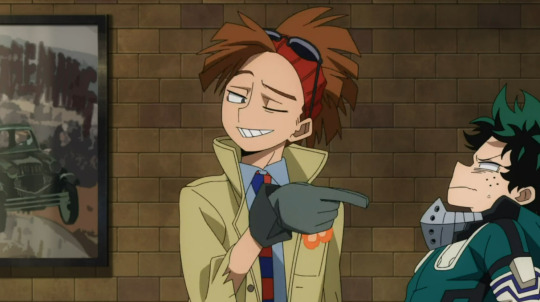
[ID: A screenshot from MHA: World Heroes' Mission. Rody is pointing at Deku, winking. Deku looks annoyed. End ID.]
to preface this:
i am not a professional 👍 i have ptsd 👍
analyzing characters is fun for me! this is how i am interpreting rody with what i know about him from the little media he's been in + some additional speculation. feel free to incorporate this into your belief system. or not! all that i ask is that you bear with me.
now, before i get into it (preface...2!):
everyone knows about fight or flight, right? well, did you know that there are actually 5 trauma responses? fight, flight, freeze, fawn, and flop. (there may be more, but these are the ones that have the most information on them.)
fight and flight are the body's primary responses to a bad situation. freeze, fawn, and flop are more complex responses that happen when the first two aren't available. little self-explanatory, but for the sake of infodumping:
freeze: the body is in a state of hyperarousal. the muscles are tight and ready for action but is ultimately paralyzed. think of a deer in headlights.
fawn/befriend/submit: this response involves complying/befriending the aggressor; people-pleasing in an effort to remain safe. this is more common in cases of abuse.
flop/shutdown/collapse: the body is in a state of hypoarousal, aka its shutting down; muscles go slack, brain stops receiving sensory info. this can often result in fainting. you know how some people faint when they see blood? or when they're on a rollercoaster? yeah, it's this.
it's important to have this context. as a matter of fact, you probably already know where i'm going with this:
rody faints when deku is climbing up the bridge. of course, right? he had reached such a heightened level of fear that, when his brain realized it couldn't trigger one of the other four responses, he just... flopped. why bring this up? well, and i think this is easy to miss, but rody didn't pass out once. he actually passed out twice.
when they first reached the train, it appears that, in their brief moment of safety, rody had collapsed.
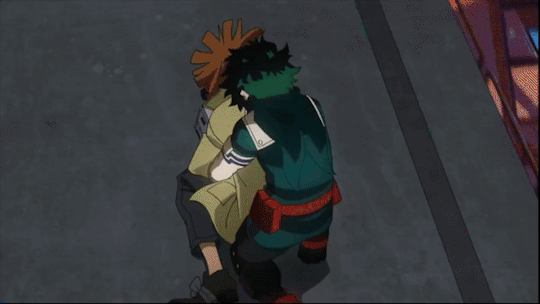
[ID: Deku picks up Rody to shield him from Beros's oncoming arrow attack. End ID.]
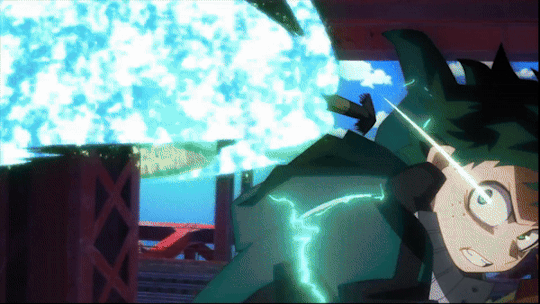
[ID: Deku is carrying Rody, swinging under the bridge in an effort to evade Beros's attacks. At the end, Rody appears as though he is coming to. End ID.]
up until this point, rody had been freaking out during their escape from the police. for him to have no initial response to being physically moved by deku... hell, he looks like he's just coming to. if we're going based off of the dub, he even yells "what's happening?!" simply put: he shut down and, more specifically, he shut down in what had been perceived as a moment of respite.
the reason i point this out is because, while we don't choose our trauma responses, there are events that can impact what they can be.
so... what is the purpose of the flop response?
quoting from an article here, but it's thought to help people in three different ways: to reduce the mental impact of the circumstances, to cause a physical disconnect (thus experiencing the trauma less directly), and to prevent additional assault.
the point i'm trying to make here is, well...
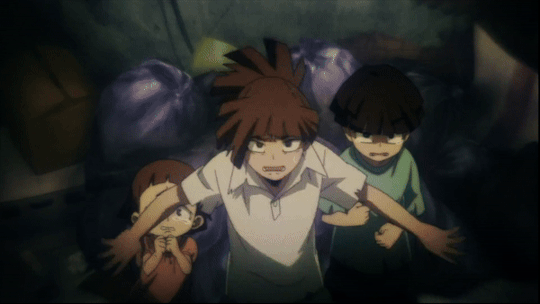
[ID: A flashback showing Rody protecting his siblings. A villain strikes him with a pipe. End ID.]
rody's been assaulted! and this is only one instance that we know of. we don't fully know what he's had to go through when providing for his siblings, but there is no doubt that there have been negative repercussions on his mentality.
did you notice how he startles easily?
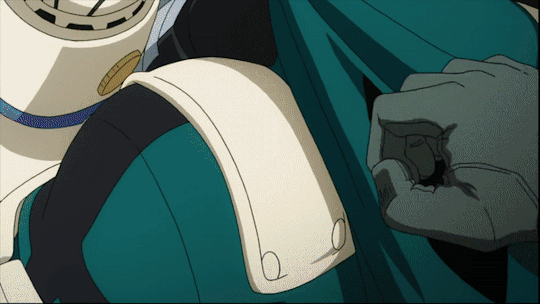
[ID: Rody puts his hand on Deku's shoulder, scaring him. His response startles Rody, causing him to flinch backwards. End ID.]
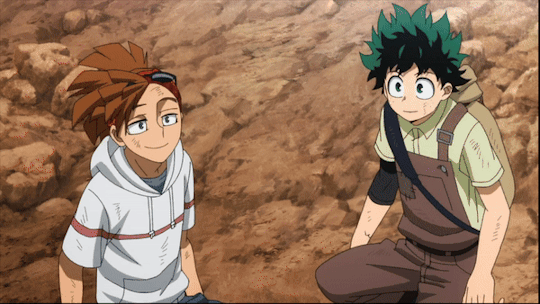
[ID: Bakugou suddenly appears behind Rody, causing him to jump. He flinches back, turning to face him. Pino is also startled, flying to sit over on his other shoulder. End ID.]
with ptsd, some people can develop an exaggerated startle response. this happens when your nervous system gets stuck in survival mode. your brain is hypervigilant; any sudden sound or movement that you don't expect can make you feel like you're in danger and your body has to be ready to react in a given moment.
look at the difference between how deku and rody flinch. deku has a standard flinch, but rody violently flinches, almost as though he's been struck. do you see how he moves his head? his arms? how, after both instances, he's starting to sweat? yeah 👍
continuing along this line of thinking, let's talk about rody's attempted betrayal.
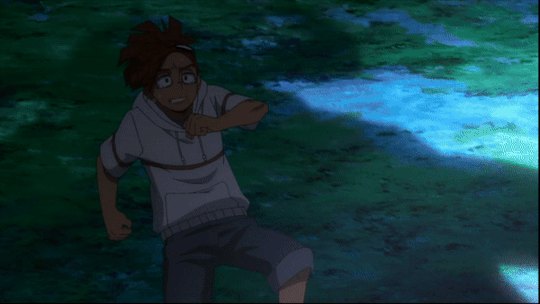
[ID: Rody being approached by the oni villain. He braces himself for the attack, clutching at his head. End ID.]
i feel like most people, when cornered and under the imminent threat of being attacked, try to block it or defend from it in some way. rody... didn't do that. as a matter of fact, it looks like he's trying to hide.
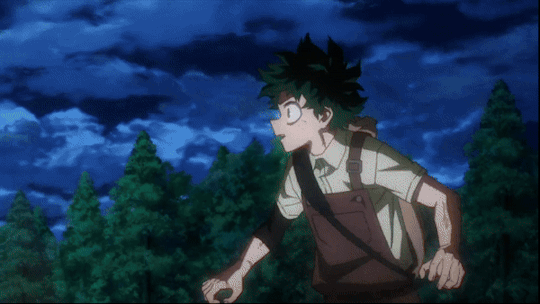
[ID: Deku runs towards Rody, shielding him from an arrow. Rody panics and turns away. End ID.]
additionally, in this scene, rody is apologizing. in this moment, he sincerely believed that deku was going to hurt him for his betrayal. instead of trying to run, he just... froze. braced himself again. i know he was very scared, but, despite deku having just saved him, seeing his fear at being approached... psychologically, there's something else going on here.
i think rody had been re-traumatized.
again, we only have that one flashback regarding a violent encounter with villains, but i genuinely have reason to believe that it wasn't a one-off scenario. the only reason rody tried to fight was to defend his siblings. they are his reason for continuing forward. but... what if there were times when they weren't there? and he had to face the villains by himself?
... yeah. i think that's why he responded the specific way that he did. his life was actively in danger, yes, but how many times had he been in that position? pleading, trying to garner sympathy about his siblings, wanting to be let go? i think the severity of his psychological distress in that instant is what caused him to try and hide rather than attempt to minimize any incoming damage.
as for feeling threatened by deku, that can be easily explained, too. rody talked quite a bit about betrayal, it seemed like a very natural thing to talk about. he's probably had to betray some villains and gotten hurt for it. honestly, you could probably argue that this contributed to his confusion regarding deku protecting him instead.
similarly with starting posts, i am also very bad at ending them 👍
tldr; rody soul has ptsd as a result of his encounters with villains after his father's disappearance. this has given him an exaggerated startle response as well as both a freeze/collapse response in times where his life is threatened. who knows what other symptoms he may have! what we can say for sure is that this kid needs therapy.
if you read all this, thanks! i hope you enjoyed me dissecting him like a bug.
#cosmic chatter#rody soul#bnha#mha#my hero academia#character analysis#blorbo tag#does a kickflip#rody 🤝 hunter: traumatized 16 yr olds who have a little bird#cw eyestrain#for the gifs. super cannot forget that
62 notes
·
View notes
Text
Thought dumps about Parkour headcanons in Mercy for the Lamb. Send help
My favorite thing about writing Mercy for the Lamb is having a series focused entirely on the trauma of four entirely different people because I get to have fun playing with how different people react to their trauma
Foooor example, four people, four trauma responses :D
Evbo - Flight (running from his problems, refusing to admit he has trauma, leaving the second someone asks if he’s okay)
He’s not used to his trauma being considered as such. A lot of his trauma responses are painfully similar to things he had to do in the Noob layer to simply survive and he has it in his head that he can’t possibly be traumatized. Even if he is, obviously everyone else has it so much worse so he has no right to complain.
EMF - Fight (Acting snappy and harsh, actively thrashes/claws when someone touches him when he’s struggling)
In his position and job, he couldn’t afford to show any kind of weakness. When he perceives a threat, he has to take the offensive first before they can start an attack against him. Attack first, questions later: it’s the only way to ensure that you have the upper hand. When the world is against you, it’s you against the world.
Seawatt - Freeze (Going still and silent, disassociating, becoming extremely numb)
It’s the safest option. It’s the idea that if he doesn’t move, no one can see him. It’s the complete opposite of what a fighter is and that means it has to be unpredictable. Running or fighting the sources of his trauma is off the table. Nowhere to run and no one to fight. Instead, it all just piles up and collapses and he freezes.
Boey - Fawn (Trying to appease his perceived aggressors, promising to stay quiet/still, doing anything he can to stay in his aggressors good graces)
It didn’t always help, but a lot of his killers seemed to like it when he followed their demands. If he tried to ignore them or deliberately disobey them, they wouldn’t just kill him: they would make it *hurt*. He got used to suggesting things that might make his killers happier in the hope that it would make his death hurt less.
A few other things that I find fun that have no reason to be pointed out but I want to anyway:
They each react to anxiety in different ways. Seawatt paces, EMF chews his claws, Evbo tugs at his hair and Boey scratches his arms. Seawatt’s pacing is harmless and EMF normally doesn’t hurt himself by chewing, but they’ve gotten Boey used to wearing thick gloves to prevent his scratching habit from causing actual wounds. It’s still a regular habit for him to offer his arms to one of the others when he feels himself coming down due to how often they had to wrap them back in the day. Seawatt and EMF will hold Evbo’s hands to stop him from tugging at his hair. It’s less likely to harm him and the pressure helps.
In the most recent story, I talked a bit about how I headcanon Pre-Fighter Layer Banishment civilization to have looked, and mentioned that each layer was known for their own products.
Noobs - Clothing creation, repair, and modification. Since their boots were leather, I figured leather working would make a lot of sense for them. Leather and wool were most commonly used but it wasn’t uncommon for other layers to ask them to make special outfits for special occasions. Fighters specifically liked to send them silk and cotton to be made into their traditional outfits for battles and parties. They would create the boots for their young family members, continuously recreating them as the players aged.
Pros - Varieties of high quality food. This one I think speaks for itself since we know they supply food in-series, but I feel like before things got bad the food was more than just “cows that are good at parkour” and “cows that suck at parkour”. They were known for their spices and cooking techniques typically passed down by parents to children or new Pros, biologically related or otherwise.
Masters - Metalworking and jewelry. This headcanon is kind of based on a separate headcanon that Masters use jewelry as courting gifts. If someone wants to court another Master, they would gift them jewelry in their colors. For example, EMF would give gold jewelry to his partner. These could include things like chest plates but only as decoration. They would’ve been responsible for creating metal-based boots for naturally born players (other players spawn with their boots, no creation necessary).
Fighters - Music and Art. While art existed in all the layers, the fighters were known for their high energy musical selection and produced discs and the things used to play them. I like to think that the fact that the Legends were locked behind discs had a significance to the Fighters, being the last remnants of their culture after their fall. Their other forms of art were considered the best and most popular. They specialized in abstract art, focused more on emotion than anything else.
Players can spawn or be naturally born. For the most part, newly spawned players would be almost immediately adopted into a family and raised as one of their own assuming they were young enough. Those that were older would be shown the ways of life by the community, often building their own unique ideas and experiences through the entire community’s efforts. There definitely might have been some discrimination, but it wasn’t as common as Class bias would have been. This still very much existed if not as violently upheld as it became.
Fighters in particular were big on family. Players that ranked up or spawned in would be welcomed with open arms and integrated into family units.
Lastly
Boey will forever be autistic. In my heart ❤️
#parkciv#parkour civilization#parkour civ#emf parkour civilization#evbo's master friend#evbo pvpciv#Evbo#seawatt#headcanon#parkour civilization headcanon#lore#mercy for the lamb#mercy for the lamb series#fanfiction#archive of our own#ao3
24 notes
·
View notes
Note
The way some people act about Curly in this fandom makes me so uncomfortable that I don't even want to interact with the fandom in a meaningful way, so much that I just talk about it with my friends or here on this blog (thank you for making this blog by the way! <3)
I see people acting like freezing up and being confused in a high stress situation or not being able to defend themselves when someone is screaming at them are "not having a backbone" and make Curly a horrible person (I think Curly could have done better, but that's not relevant to this ask). I do that constantly, I have been in stressful situations my whole life and I simply freeze up and I can't react, am I a horrible person?
I know Curly isn't real, but people do realise that people can see themselves in Anya (I do as well), but they seem to completely forget about how people can also see themselves in Curly. His reactions felt so real to me, I deeply connected with him, because of how much he reminded me of myself when I am scared and anxious. I also like that they made a guy (I am a guy too) react with the freezing, I would argue he also does the fawning response, because I feel like fighting is more associated with men. I am talking about the four Fs of responses to fear: fight, flight, freeze and fawn, for those who don't know.
I can't stop people from saying those things and acting like it's ridiculous that Curly couldn't act, because it's not their fault, I don't expect people to understand every trauma response that exists. I just wanted to vent how I feel, because I feel a bit silly for getting so passionate about a fictional character.
.
#curly mw#curly mouthwashing#captain curly#mouthwashing#mw#anonymous#anonymous confessions#mouthwashingconfessionsblog
28 notes
·
View notes
Text
no ok the more I’m reading through the hotd tag the more pissed off I’m getting bc what do you mean the blood and cheese scene was underwhelming???????? I understand that it was extremely different from the source material and that people had high expectations for the screen adaptation, but the way most of y’all are complaining about it has me sick to be honest.
The main complaint I’m seeing (and willing to argue against bc there are some other gripes that I refuse to entertain) is that it was “less impactful” and that it “doesn’t do Helaena’s character justice”. I’m seeing people say that the horror of the situation was lost without Helaena’s pleading and offering herself in their place to save her children, and that her descent into madness will make less sense now without her Sophie’s Choice backfiring on her and being forced to live with the guilt of sentencing one son to die only for the other to be killed instead. I think this response of pleading and begging and offering oneself in place of a loved one (especially a child) is easy to understand and I believe we all would like to think that it would be our response in an unimaginable situation such as the one Helaena is faced with, but when it comes down to the actual trauma response, no one knows until they’re in it.
Some background on trauma responses: when faced with trauma, a person’s response tends to fall into one of four categories. Most people associate the term with the more commonly known responses of fight or flight, but the other two lesser known responses are freeze or fawn. Freeze is rather self explanatory with the person essentially going into shock and failing to react at all. Fawn is probably the least commonly known response with the person essentially resorting to people pleasing and appeasing in order to avoid further harm.
Where book!Helaena’s response was fight, show!Helaena’s response was fawn (and arguably freeze with what appeared to be disassociation). That doesn’t make her wrong or a bad mother as some of you are suggesting. She was experiencing an extremely traumatic event with a knife to her throat and two sleeping children only feet away from her with her only options being to surrender her son or risk losing them both as well as her own life. Trauma responses aren’t something we control, and blaming her for hers is greatly misunderstanding the nuance of it all. Showing that there ARE multiple ways to respond in traumatic situations made sense with this version of Helaena’s character with all of her other reactions we have seen throughout the show so far.
I get that people are also mad that Alicent wasn’t there for the situation and especially that she was instead fucking Cole, but I honestly think that that is a different horror of its own. Book!Alicent shared in Helaena’s trauma of being forced to choose between her children and is helpless, but show!Alicent doesn’t even know that there is danger. She doesn’t know that their security was breeched (partially due to the fact that she is fucking the HEAD of security at the moment) and she doesn’t know that her daughter has just had to make the impossible decision to surrender her son to save her daughter, knowing that her daughter is “of lesser value” and that SHE will be blamed for the heir to the throne being assassinated in front of her while she was powerless to stop it. Alicent will feel the guilt of not knowing that her daughter needed help and she will feel the guilt that while it was happening she was “sinning against the gods” with a man she knows she shouldn’t be. Holier than thou Alicent was caught in the worst possible way and I doubt she will forgive herself.
I can understand being annoyed when an adaptation strays from the source material, but being upset that this particular event was “watered down” or “sanitized for television” has me questioning why you wanted to see a pure translation of the scene in the first place. The shows have diverted from the books for better and for worse in the past and while I understand and agree with book purists on some storylines or scenes being changed, this is one I firmly believe was justified.
#hotd#house of the dragon#blood and cheese#helaena targaryen#alicent hightower#criston cole#*steps off of soap box*#some of you need help
23 notes
·
View notes
Text
Fun prompts and models for writing believable trauma and psychological change
wanted to share some resources I use all the time bc I hope they will be helpful to anyone who gets stuck with character growth, but mostly because I love to nerd out and gatekeeping knowledge is not very hot girl summer
1. The 4F Model of Trauma Response
The human nervous system has four basic reactions to threats: Fight, Flight, Freeze, and Fawn. A healthy nervous system is able to access all four based on the situation, move adaptively between them as needed, and return to a calm state when the danger has passed. People who experience trauma or who grow up in dangerous/neglectful environments can get stuck in a maladaptive pattern of one or two responses. People can also get stuck in chronic stress response which causes lots of physical and psychological problems.
Example: Jo's father yells at them when he is in a bad mood. Jo learns that they can avoid being yelled at by figuring out what makes their father mad, anticipating his moods, and catering to his preferences (Fawn). In adulthood, Jo often emotionally caretakes for their romantic partners, and finds themselves in relationships with people who take advantage of this.
For writing: Decide which response(s) a character gravitates toward to determine how they'd react in certain situations. Demonstrate change by having them learn and practice a new reaction, build awareness of their own pattern, demonstrate cause and effect, etc. How does the stuck response show up in big and small ways? Under what circumstances would they react differently?
2. Erik Erikson's Stages of Psychosocial Development
Children develop in stages that each feature two opposing psychological tendencies: Trust v. Mistrust, Autonomy v. Shame, Initiative v. Guilt, etc. People can become stalled in a phase or stuck in maladaptive patterns because of a trauma or unmet needs. The effects on relationships and functioning in the present reflect which stage is unresolved or during which stage the damage occurred.
Example: Becky's mom solves all of her problems instead of appropriately encouraging her to try. Becky misses opportunities to watch herself succeed and internalizes the belief that her mom thinks she can't do anything for herself. She grows up into an adult with patterns of passivity in relationships, difficulties with motivation, and low self-esteem.
For writing: A character's main arc could be about resolving one of these stages, or struggling with its effects in their life. It can also inform how they react to closeness with others and obstacles that arise. What did a past trauma teach them about how the world works? What events would challenge their beliefs? What would motivate them enough to change, and what circumstances would allow that to happen?
3. Lawrence Kohlberg's Moral Development Theory
People develop morally just as they do physically and psychologically. Kohlberg outlines six stages of moral development beginning with Punishment/Obedience (morality is determined by consequences) and ending with Universal Ethical Principles (a personally developed set of ethics that applies to all situations, regardless of law). People experience moral development when their current stage does not address the nuance of a situation they encounter.
Example: Martin thinks gay people are immoral because the Bible says so. Martin's sibling comes out as gay, and he knows his sibling is not evil. Martin re-evaluates his belief system and acknowledges limitations of the Bible as a moral primer.
In writing: Ethical dilemmas ethical dilemmas ethical dilemmas. Characters develop by challenging long-held belief systems. This can be VERY painful and destabilizing! What circumstances would cause them to change their mind? How do they react to someone at a different level? Do others understand their principles? How do they react when their beliefs are challenged?
4. Three Stages of Trauma Recovery
Trauma recovery typically occurs in three progressive stages: Safety and Stabilization, Remembering and Grieving, and Reconnection and Integration. People establish baseline stability, explore effects of trauma and emotionally grieve loss and change, and integrate insight and meaning into a new sense of self.
Example: Alex was a victim of a home invasion and afterward feels unsafe at home, compulsively checks locks, has panic attacks when alone, and starts drinking to cope with their emotions. Wanting to feel better, Alex moves to a new apartment, gets a dog, and takes up knitting instead of drinking. Alex opens up to trusted people and begins feeling bursts of sadness and anger, realizing the break-in destroyed their belief that people are mostly good. Alex gets involved in advocacy for trauma survivors and uses their experience to practice compassion toward themselves and others.
In writing: The aftereffects of trauma involve new (often negative) beliefs about oneself, others, and the world at large. How would a specific trauma change their beliefs? What meaning would a character make about what happened to them? How would it affect their relationships? What stage would a character struggle most with? What emotions would need to be felt in order to move forward? How would it change the trajectory of their life?
15 notes
·
View notes
Text
Updated! X-Files Mulder Trauma Responses: Fight, Flight, Freeze, or Fawn?
I've seen various takes on Mulder's and Scully's trauma and stress responses; and I wanted to autopsy the issue carefully to reach a conclusion. We're focusing solely on Mulder here-- but! Scully will get her own post in future.
Kitsunegari Sums Up Mulder's Trauma Responses in One Scene
Mulder is too late to stop "Scully" from pulling the trigger against her temple, screaming in agony as she drops to the ground, "dead."
He then cycles through all of his First and Secondary Trauma Responses (will be discussed below):
Running up in horror, then plastering a smile in sickening denial--
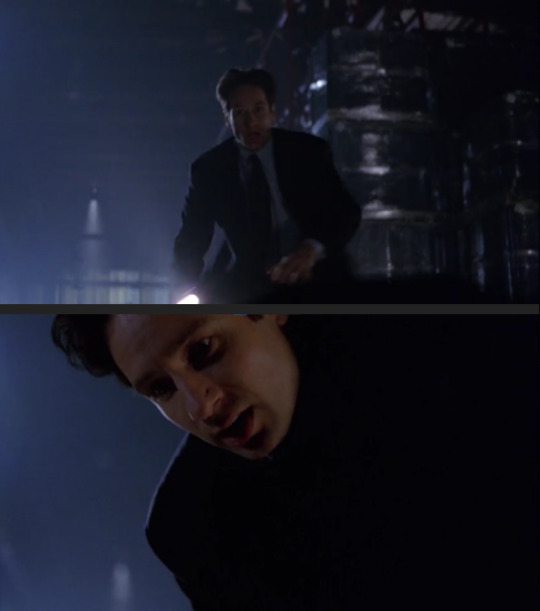
Mulder attempts to feel a pulse. There is none. Scully is dead.
His grief overwhelms him-- an aggravated and more violent (if shorter) version of his sorrow in Redux II-- scrabbling at her scalp and shoulders, silently screaming into her face, before turning away so as not to vomit.

He mentally starts to drift;
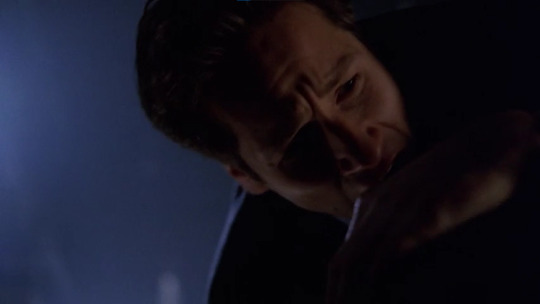
but denial-- denial, denial, denial-- holds sway as he pops his head back up, reenergized,

vainly feeling for a pulse once again, eyes desperately and obsessively focused on his partner.

There is no hope.
Mulder is now losing all control, probably gearing up to an epic meltdown of Biblical proportions-- heavy breathing, desperate eyes, nothing to grasp at or solve or hold onto--
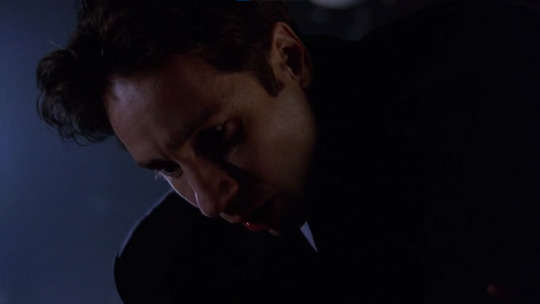
when he hears a noise. A reprieve. A focus. An enemy.
Furious, he snatches a gun and levels it at Linda Bowman, spitting in his fury
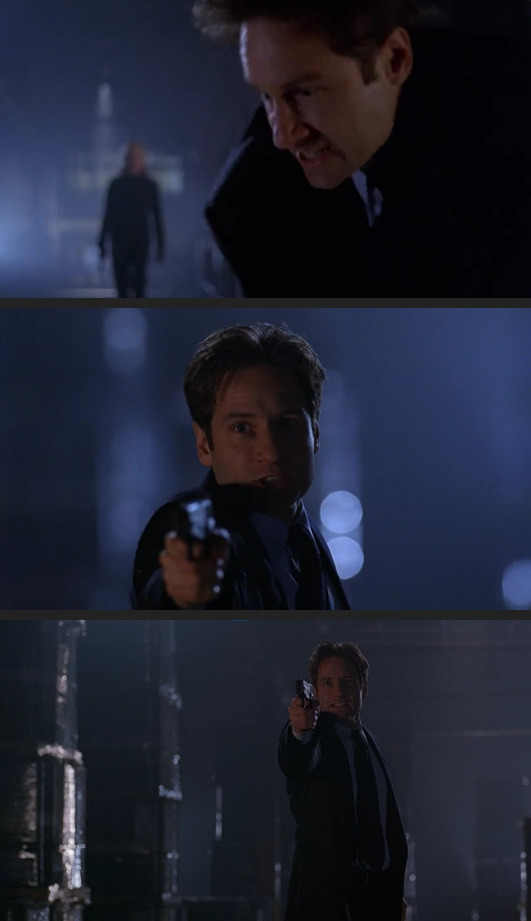
...but doesn't fire.
And allows "Bowman" to talk him down.

And further, when "Linda" fires, Mulder flinches, puts his gun up as he dissociates (looks down to his mid-left)-- freezes, if you will-- and doesn't fight back, expecting to die.

This is Mulder's Trauma Responses in full: Freeze-Fight.
He will also begin to repeat this cycle in Milagro (if shorter-- because Scully pops up, alive, sooner.)
Why Mulder Is Primarily a Freeze Type
I'm going to include this entire segment from Pete Walker's Complex CPTSD: From Surviving to Thriving (see notes at the bottom for more info) because it's such a powerful piece of Mulder-psyche that it should stand on its own:
"A Freeze Response is triggered when a person, realizing resistance is futile, gives up, numbs out into dissociation, and/or collapses, as if accepting the inevitability of being hurt.... The Freeze Response, also known as the Camouflage Response, also triggers a survivor into hiding, isolating, and avoiding human contact.
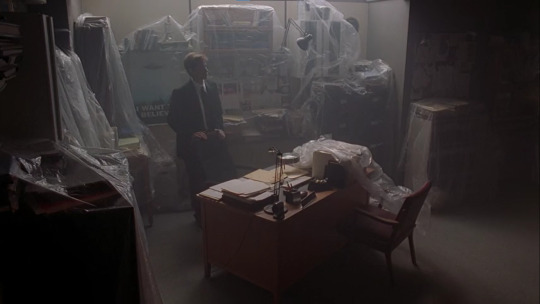
The Freeze Type can be so frozen in the retreat mode that is seems as if their "Starter" button is stuck in the "off" position.

Off all the four Fs, Freeze Types seem to have the deepest and conscious belief that 'people' and 'danger' are synonymous.

While all 4 F Types commonly suffer from social anxiety as well, Freeze Types typically take a great deal more refuge in solitude.
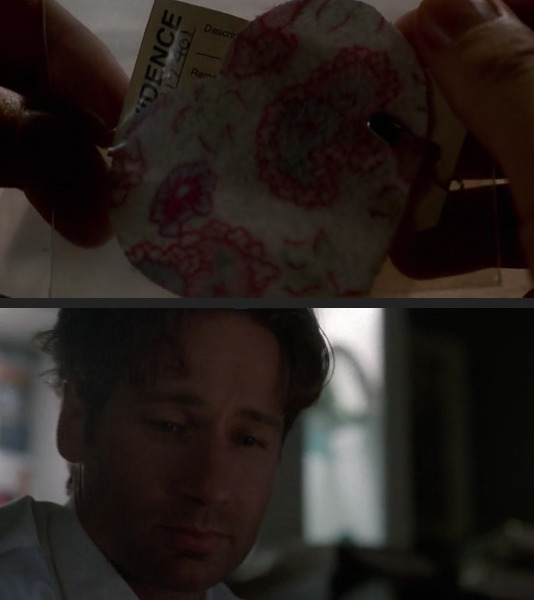


Some Freeze Types completely give up on relating to others and become extremely isolated. Outside of fantasy, many also give up entirely on the possibility of love."

These Types have learned from a young age that fighting back will only get you punished and that fleeing will only get you reprimanded; so, they collapse inwardly instead. Dissociation becomes the name of the game, coasting through life without being attached to it, accepting its blows and distracting themselves from reality with either fantasy or the pursuit of a fantastical idea they want to achieve.
Frank Spotnitz said it best when he reflected on Mulder's character growth and seeking 'The Truth': ""You can't get the truth. You can't. There's a larger truth, though: that you can't harness the forces of the cosmos, but you may find somebody else. You may find another human being. That may be kind of corny and all of that, but that's really it: Love is the only truth we can hope to know, as human beings. That's what Mulder and Scully found after nine years. And that's a lot."
But what about those moments when Mulder runs at danger, demanding answers and yelling down the sky?
**Edit: This is the section i had to refurbish based on proper research.**
Secondary Trauma Responses develop when circumstances are so extreme that a person's initial trauma response is not removing them from danger fast enough; and they then develop a second polar opposite response in the hopes that this will help. More often than not, it simply becomes a ping-pong whiplash between one extreme to the other. The four Hybrids are Fight-Fawn, Fight-Freeze, and Flight-Freeze. In Mulder's case, if he stays frozen for too long he will very quickly become very dead; thus, Mulder developed a secondary response: Flight.
Freeze-Flight (or Flight-Freeze-- potato, potatoh) Types

Below is an excerpt from Pete Walker, but it's so completely Mulder that I have nothing else to add:
"The Flight-Freeze Type is the least relational, most schizoid hybrid. He prefers the safety of "do it yourself" isolationism. The Fight-Fleeze Type avoids potential relationship traumatization with an obsessive-compulsive dissociative two-step. Step One is working to complete exhaustion. Step Two is collapsing into extreme vegging out and waiting until his energy reaccumulates enough to relaunch into Step One. The price for this time of no-longer-necessary safety is a severely narrowed existence."
(**Note for the below paragraph: the author is not talking about alpha/beta in the current, dilapidated vernacular. Think of it as an academic term describing more aggressive or assertive behavior as compared to more passive or dismissive behavior.)
"The Flight-Freeze cul-de-sac is more common among men, especially those traumatized for being vulnerable in childhood. This then drives them to seek safety in isolation, or "intimacy lite" relationships. Some non-alpha type male survivors combine their flight-freeze defenses to become stereotypical technology nerds. Telecommuting is, of course, their preferred modes.
Flight-Freeze Types are the computer addicts who focus on work long periods of time and then drift off dissociatively into computer games, substance abuse, or sleep binging. FF Types are prone to becoming porn addicts: when in Flight mode, they obsessively surf the net for phantom partners and engage in compulsive masturbation. When in Freeze mode, they drift off into Right-Brain sexual fantasy world if pornography is unavailable. Moreover, if they are an intimacy-light relationship, they typically engage more in with their idealized fantasy partners than with their actual partner during real-time sexual interactions."
An interesting note: these types are often misdiagnosed with Aspergers Syndrome, which explains why some fans theorize that an Oxford graduate-FBI field agent might be on the spectrum (Mulder isn't: it's a symptom of him coping very, VERY badly.)
Mulder's Freeze-Flight response kicked in sometime after his sister's abduction, since his primary Freeze response "prevented" him from saving her (even if he couldn't do anything to help.)
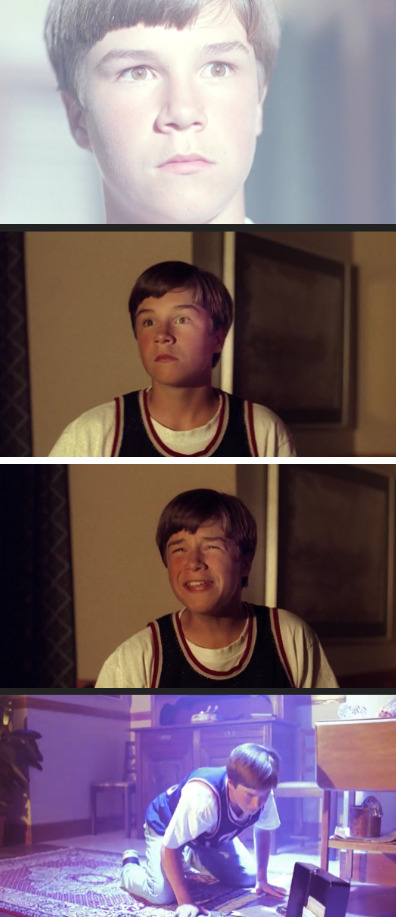
Since then, Mulder has buried all trauma or deep emotion in the bowels of his work in the basement, printing them out as X-Files to brand his work as his life.
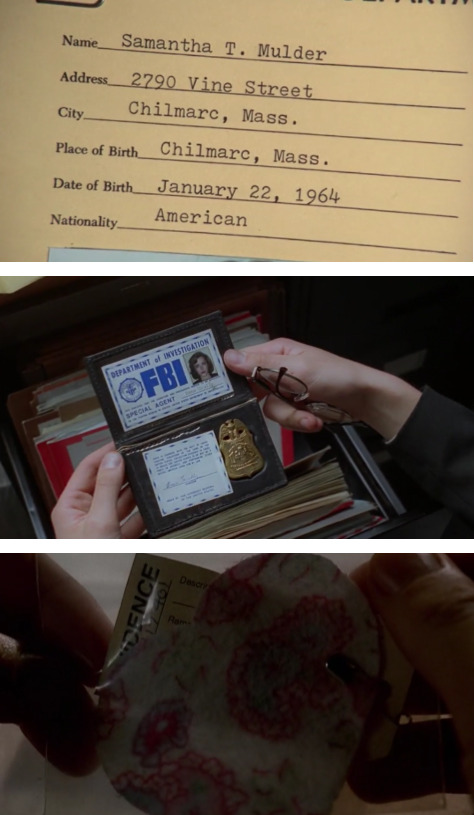
For all of Mulder's talk about disliking others for dismissing something that cannot be explained, labeled, or categorized, when he can't do it himself, he goes berserk: first freezing, horrified, before he launches with righteous fury into his work, demanding answers and running himself ragged.
A potent demonstration of Mulder's yo-yo-ing Freeze-Flight Response is the Russian Roulette showdown in Pusher: Mulder more readily accepts his own death than Scully, terrified but determinedly compliant... until she becomes the next target of Modell's mind games.

It's a pattern that has already been established since her abduction, and which repeats for her cancer (and every perilous moment after and in-between.)


An important
There are countless examples where Mulder disconnects from reality in the face of great grief, ala his father's death, CSM and Diana Fowley's oily plan in One Son, and-- especially-- his mother's suicide.
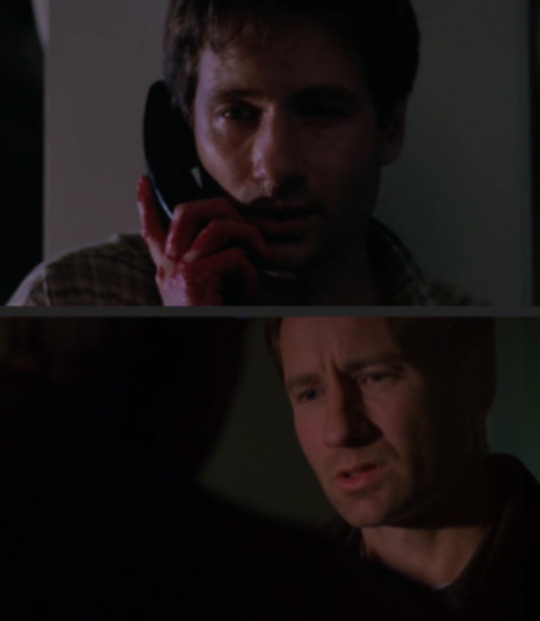
In all these instances, Mulder immediately ran into work mode, trying move the world by force and come up with an explanation-- any-- to make everything right. When he is forced to sit and deal with tragic loss, his Flight peters out, leading him back to square one: an unhealthy Freeze Response.
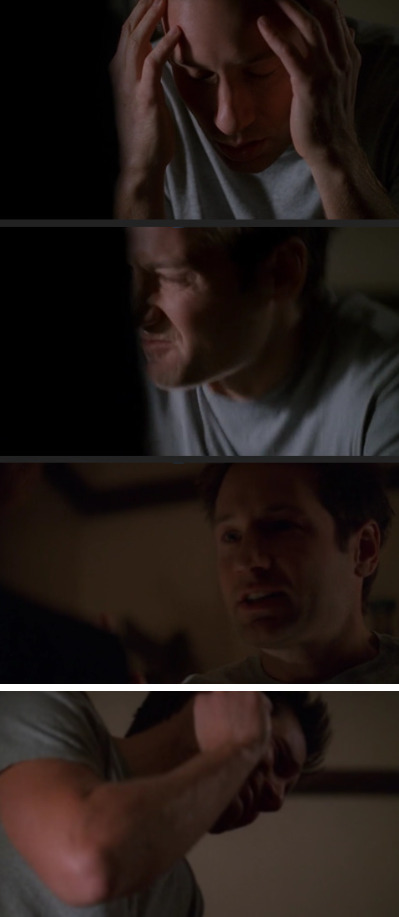
Luckily for him, Scully is a stable, reliable support; and coaxes him into properly grieving by not sugarcoating the Truth, thereby helping him turn into healthier coping mechanisms (if he wants to use them-- he doesn't in Paper Hearts, but he does in Sein und Zeit. Baby steps.)
In short: Mulder is a Freeze-then-Flight man.
Why Mulder Isn't a Fight, Flight, or Fawn Type

To make quick work of this, I'll rely mainly on Pete Walker quotes again and add my commentary after his statements:
"A Fight [Trauma] Response is triggered when a person suddenly responds aggressively to something threatening.... Fight Types are unconsciously driven by the belief that power and control can create safety, assuage abandonment, and secure love." Extreme Fight Types often become bullies or narcissists to their loved ones as well as their enemies if left unchecked. They are demanding, demeaning, and punishing, equating strength as exerted power over someone weaker. They usually grew up in homes where they had to fight back against physical abuse or protect others from it. This translates to a bitter outlook on the world, always suspicioning the motives of others in cruel or judgmental ways.
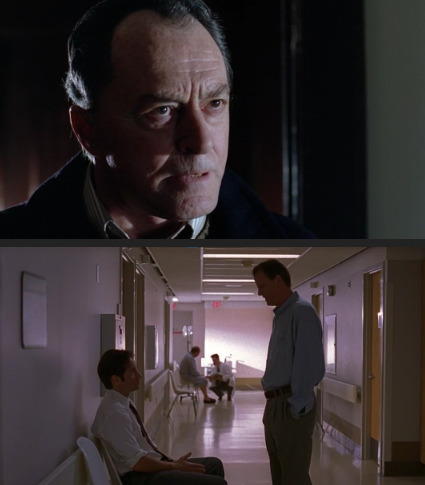
(Note: Not much of the above is directly related to Bill Scully-- or Bill Mulder, even, see my previous post about him here-- but his natural bent is Fight above the other 3 F Types. Doesn't mean he's a bully or a narcissist; just that those would be his extremes.)
As we have seen through the entire series, Mulder as an atypical American masculine archetype: he does not resort to violence, preferring to save victims and even villains, willing to give everyone a second chance (and, by extension, giving backstabbers a clear target for their next strike.) The only time he has exerted violence over another was as a last possible extreme to stop a threat (shooting Modell, shooting the Peacock brothers, shooting Schnauz, shooting Roche, etc.)
Back to Walker:
"A Flight Response is triggered when a person responds to a perceived threat by fleeing; or, symbolically, by launching into hyperactivity. .... Extreme Flight Types are like machines with a switch stuck in the 'on' position. They are obsessively and compulsively driven by the unconscious belief that perfection will make them safe and loveable. They rush to achieve. They rush as much in thought in action, compulsion."
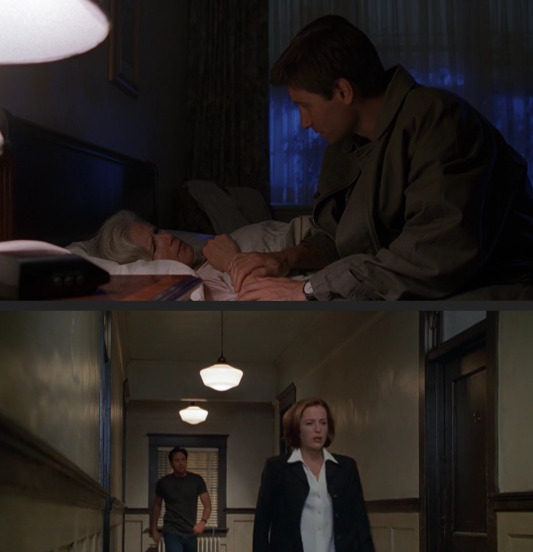
I will be talking about this response a little bit more in a follow-up post; but the core with this character is their ability to distract themselves from their problems into oblivion. Mulder's pains and sorrows and traumas are a constant of his life, eating away at his heart and shoving themselves in his face every day. The difference between his obsessive work ethic and a Flight Type's work ethic is the motivator: he is dabbling in his fantasy, building empires from ideas and discovering new kingdoms with every possibility; while Flight Types have ceased to function at all, robotically going from task to task until they overload or shut down.
And, lastly, back to Walker for the Fawn Trauma Response:
"Fawn Response is triggered when a person responds to threat by trying to be pleasing or helpful in order to appease and forestall an attacker.... Fawn types seek safety by merging with the wishes, needs, and demands of others. They act as if they believe that the price of admission to any relationship is the forfeiture of all their needs, rights, preferences, and boundaries. The disenfranchisement of the Fawn Type begins in childhood... learns early that a modicum of safety and attachment can be gained by becoming the helpful and compliant servant of... exploitive parents." (As an aside, this Type is also formed from having at least one narcissistic parent.)

While Mulder is often used by those around him, he never loses the core of who he is to their abuse: when Phoebe comes knocking, he may set aside the case to (try to) get some hotel action; but he's still self-aware of his and her actions, disentangled enough to self-deprecatingly (and knowingly) smirk when he catches her red-handed with another man. When his father or mother weave in and out of his life with their soft or outspoken demands, he doesn't bend from the Truth, risking his relationships continually for It. He is willing to tell Scully to her face she is lying to him; and he is willing to sacrifice what new closeness they've achieved if he believes she's being purposefully blind or obtuse. Mulder, while reliant on Scully as his human credential, is not co-dependent on her: he can stand on his own two feet, even if she were to walk out of his life. The wounds would go deep; but he would dissociate from life (like he had in Little Green Men) not erode away completely.
(As an aside, that's why probably why Mulder would have committed suicide in Gethsemane but not during the Break Up Years TM. Post IWTB Scully, while she had walked away from their life together, was still a part of his reality; whereas, S4 Scully would have been dead, deceased, gone from existence... and Mulder could never escape that, no matter how much he dissociated from it.)
How Mulder Can Use His Freeze Response Healthy
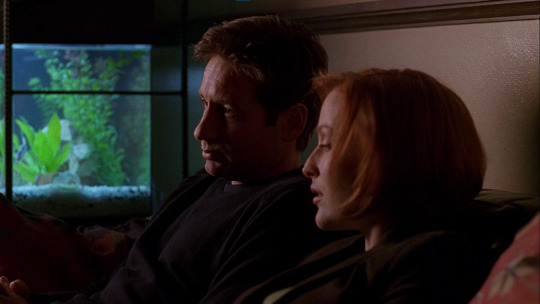
In a nutshell, a person should work through their traumas so they can pick among the 4 Trauma Responses for the healthiest outcome in each situation: Fight for healthy boundaries, Flight for healthy retreat and perseverance, Freeze for healthy awareness and distanced assessment, and Fawn for healthy assertive listening and peacemaking. Unhealthy childhoods create fixations on one of these four; and it takes a while to learn the patterns and triggers in one's life and how to manage them.
For Mulder, he grew exponentially through the years, becoming less detached and more engaged with "life on this planet" (growing from a sarcastic S1 recluse to a more emotionally honest person in S2 to a more openly supportive person in S3 to a transformed heart-on-his-sleeve man in S4-5 to someone who can find joy in S6 and peace in S7 and recreation in S8. Is there canon after that?) So, as it stands, he's doing just fine. Because if one truly searches for the Truth it might not be aliens: it might just be a whole, happy life and how to enjoy it.
And there you have it, folks!
Scully will get her own follow up, soonish (though if you don't want to wait that long, she's a pretty obvious *spoiler* Flight Type. No one's really surprised because of what happened in Fight the Future.)
Thanks for reading~
Enjoy!
*Note*: There are four main trauma Responses: Fight, Flight, Freeze, and Fawn (taken from the book Complex CPTSD: From Surviving to Thriving by Pete Walker-- see Disclaimers section below for info.) In short: Fight Types responds to stress by physical intimidation or verbal bullying; Flight Types run as far as they can from danger or distract themselves from it as much as possible; Freeze Types disassociate, seeing fight and flight as futile and becoming numb to life; Fawn Types try to win favor from their oppressor, leaning co-dependently on others.
**Note**: Most of the information was obtained from Complex PTSD: From Surviving to Thriving by Pete Walker, a private counselor and lecturer for thirty-five years. As a victim of CPTSD himself, he made a study of its victims and helped craft a system for CPTSD recoverees to understand themselves and progressively heal. (Highly recommend his book-- excellent.)
***Note***: I will ghost edit later. Brb.
#txf#meta#xf meta#x-files#xfiles#the x files#Mulder#Fight Flight Freeze or Fawn#4 F Trauma Responses#Kitsunegari#S5#analysis#Frank Spotnitz#quote#Fight#Flight#Freeze#Fawn#trauma#he's doin' all right#Updated
60 notes
·
View notes
Text
Mentopolis: Wordplay for Episodes 3 and 4
Spoilers through episode 4 of Mentopolis!
The Four Fs - Fight, Flight, Freeze, or Fawn are instinctual, reflexive responses in a person when it comes to stress or trauma. In Mentopolis the Four Fs are siblings: a family of local officials (not from Cortex City) who had their own keys for the reflexive switchboard at Oblongata Station.
Ivana Popov - (Fight) I wanna pop off, a phrase meaning one wants to "fight/throw down/go all out." It usually refers to aggression or intensity, depending on the context. ("Art department really popped off this season" for example, means that production worked so intensely that it reflects in the final product in a powerful way. It does NOT mean "Rick Perry and team were literally boxing each other around the set.")
Ivana is Elias' Fight response, personified as a retired fighter turned coach. She listened to Conrad on the day of the ice skates incident, and used her key to have Elias stand up on his sister's behalf. This action was poorly received in the outside world by both the bully and by Elias's own sister.
Frank Freeze - (Freeze) He literally freezes up with fear and anxiety about making the wrong choice. He took over "driving" Elias just as the bully chose to retaliate against the big guy. He argued with his sister Fight after the incident, believing that listening to Conrad was a bad choice. He disappeared before the Four Fs were officially let go. (Side note: Someone mentioned the Four Fs were fired by Mayor Logic, whereas Ivana mentioned handing over her key to the DA). He masqueraded as a being of reason, but used his skill for What Ifs to avoid direct actions and to persuade others to maintain the status quo.
Fanny Fawnsworth (mentioned) - The Fawn response. She is known to work for Don Avaricci now. Given her inherent nature, she's likely a people pleaser.
Flight (mentioned) - Missing in action, allegedly skipped town after they were all fired. Current name unknown.
Las Vagus Casino - Play on Las Vegas, Nevada and the Vagus nerve. The vagus nerve affects both sensory and motor functions and is a very long nerve in one's body. It connects to digestion, heart rate, breathing, and more. In short look at it as a connective path between the brain and the gut.
The psychometer project - Psychometrics refers to science about measuring mental processes. Psychometry refers to object reading, usually. Basically clairvoyance through touching an inanimate object. In this case, we're actually touching the frequency of someone's brain. "There's an interaction, there's actually something from the machine touching the mind to be able to get an accurate reading. " Gobstopper Industries essentially wanted a way to sneak a peek at someone's brain - allegedly for the purpose of helping and diagnosing people, but if that was ever true, they've clearly changed their plan for more nefarious purposes. The psychometer affects Mentopolis through the appearance of the white key - a "key to the city", one might say.
Immanuel and Imogen Pulse - Imelda's parents. They are similarly named as they are all aspects of Impulse.
Dominick "Dom" Nuntz - (Dominance) Despite the powerful name, this concept is weak for Elias. He has the benefit of Ivana in his corner as a trainer, but both have been hindered in their functions
Self Doubt - Pretty explanatory. He's big and burly and intimidating because he gets a LOT of exercise from Elias.
Stacy Fakename - At first this was just an obvious alias introduced by Imelda, but it seems to have taken on a life of its own beyond the PCs. Max at Oblongata Station says that a Stacy Fakename has 300+ counts of skipping out on their train fares.
Jacques Ennui - (Ennui) The organ grinder that wanders Mentopolis, and the manifestation of weariness/dissatisfaction for Elias.
Officer Joie de Vivre - (Joy of Life) An easy-going guy who seems a little bit of out of place as a Shock Trooper. As an NPC, it's amusing that he keeps finding a sort of positive spin on things, but what about as a manifestation for part of Elias? Does this mean Elias has a misplaced tendency to find or ascribe meaning when there isn't one? Or is he lying to himself about what makes him happy?
UPDATE for Mr. H.V. Lance - Instead of Vigilance, it looks like the Deputy Chief of Staff to the mayor is actually Hypervigilance. He's on the lookout for threats, and tends to OVER-estimate them.
Pasha N. - (Passion) Another concept for Elias that is surprisingly not aggressive. His passions have quieted over the years, been refined and narrowed. Pasha herself is a forensic scientist, which lines up with Elias's scientific pursuits. Her current role seems more like the receptionist for the police evidence locker. Her knowledge of bird facts is going completely unused until the Fix strikes up a conversation with her and they hit it off. They have the slightly awkward mutual connection of Ichabod Ice Skates - Fix remembers him from the Hall of Interests in Episode 2. But Ichabod is Pasha's late brother.
Thalamus & Sons - The hypothalamus helps keep the body in balance through the sending and receiving of signals. In Mentopolis, this appears to be a business, presumably a family-run one. Norrell Ojiccle obtained the copper gun here. More may be gleaned in episode 5.
EDIT: I think the Thalamus is actually a specific part of the brain besides just the hypothalamus, so there may be more to that explanation.
24 notes
·
View notes
Note
why are the ones that mikoto actively reaches out to (kotoko, shidou, kazui) also the ones that he deemed "could probably do bad things" in the voice drama
A good question! But first, an aside: if you're the anon who asked about the Mikoto-Haruka parallels, know that I did get your ask and enjoyed it. The thing is that my first draft for the answer post got eaten by a blackout, the second I threw out because it was too messy, and after that real life got complicated. But still, it's coming to your dash Soon! (TM)
Anyways, there are two possibilities: the fact that Mikoto thinks they could do bad shit is unrelated to him interacting with them, or it isn't.
If it is, then we need an explanation for why he picked those three. I already posted some time ago how I like to interpret that Mikoto goes out of his way to talk with Kotoko because he thinks she's a loner and he doesn't want her to get left out. For Shidou and Kazui, they simply spend time together due to their shared 'hobby' of smoking, which Mikoto says he picked up specifically for socializing purposes. I think he may also admire them to some degree; Shidou is in a very respected profession and quite young considering he's already practicing, while Kazui is considerably older and has a general feeling of being affable and having his shit together.
They're just fairly easy to get along with in general, at least in the surface: they don't already dislike Mikoto like Mahiru and Kotoko, don't ask awkward questions like Yuno or have terrible social skills like Haruka and Fuuta. Neither do they have a big age gap that would make Mikoto feel weird about interacting with them as peers, like with Amane and to a lesser extent Muu (and Muu also indirectly falls into the 'dislikes Mikoto' category by virtue of being uneasy around all older men).
Okay, that’s all well and good, but what if it isn’t a coincidence?
Well, have you heard of the fight or flight instinct? You might even know it as fight, flight or freeze. There’s a fourth proposed option called fawn. Instead of trying to escape or defeat the threat, a fawn-type response works towards appeasing it. The idea being that if you’re sufficiently nice and helpful and non-threatening, people won’t find a reason to hurt you.
Fawn was originally coined by the psychotherapist Pete Walker in Codependency, Trauma and the Fawn Response, and expanded on with The 4Fs: A Trauma Typology in Complex PTSD, which explains how early childhood trauma can cause people to develop unhealthy ways to socialize, based on which of their fight-flight-freeze-fawn instincts, AKA the titular 4Fs, predominate.
Pete says that people with childhood trauma are often unusually inflexible in their use of the 4Fs. While a healthy person can make use of all four with moderation and pick the one most appropriate to their circumstances, a traumatized person uses only one or two, taken to harmful extremes.
It’s clear how cut-off Mikoto is from his own fight response, to the point it’s all redirected towards a completely different alter, but the most obvious example of over-relying on one approach is during Kotoko’s birthday convo. He knows that Kotoko attacked him and others. Even if he can’t remember, it’s clear on the wounds on his and other’s bodies that it happened. He’s most likely aware that Kazui’s attempts to convince her to stop have utterly failed, as she’s intent on trying again. It’s not like she was ever particularly nice to begin with, either. And yet, he keeps track of her birthday and goes to congratulate her. Why would anyone do this?
Well, it makes sense if fear makes you more likely to try to win somebody over, not less. It’s patently ridiculous to think that the person who tried to kill him will become his friend just because he was nice to them, but fear is oftentimes irrational, and Mikoto lacks the mental tools to find a more adequate approach. He just can’t accept that somebody want to murder him and all he can do is sit there and hope some outside force stops them, so he’s desperately repeating his ingrained response to conflict. He’s spent his entire life making sure everyone liked him, how could he die by having somebody hate his guts so much they’ll kill him? He’ll just have to try harder to be more likable!
Indeed, you can see this sort of response, obviously in a more subdued fashion, in Mikoto’s approach to socialization in general. For example, look at all the focus he puts on the fact that “you can’t work/live in society/thrive unless you’re sociable”. That’s literally “I’m nice because I’m scared of the consequences if I ever stop” in nicer words. And clearly that fear looms large over him: look at how he lets his boss overwork him (lack of boundaries is a sign of an unhealthy fawn response), or how the tiny rejection of a single person not wishing him a happy birthday is enough to leave him sleepless.
While the BD convo is the most obviously dysfunctional show of this tendency, it was most likely always present, especially since attachment styles generally develop during childhood. So, perhaps it’s the very fact that he’s afraid of Kotoko, Shidou and Kazui that drives him to be extra nice and sociable with them.
But, why would he feel particularly intimidated by these three people, especially at the start? Well, first things first: Kazui is huge and ripped. Jackalope’s first impression of him is literally “he looks like he could beat anyone here in a fight”. Even if he’s a nice guy himself, it’s easy to see why somebody might be put on edge by that. Kotoko is in a similar situation: she’s visibly muscled and while she’s actually four centimeters shorter than Mikoto, that’s still pretty tall. Not to mention she lacks Kazui’s laidback personality, being quite cold and often nosing around for info on the other prisoners. They’re also both trained in martial arts, making them even more of a physical threat.
Shidou is similarly not very approachable, with Mikoto even saying as much in a conversation with Fuuta. Another factor, I suspect, is the very thing I mentioned above as a possible reason for Mikoto to admire him: Shidou is a very young professional in a respected job. If we assume he’s been doing surgeries for several years before the flower person’s death (which makes sense, since it’d take a while to find the right organs and too many ‘failed’ surgeries at once would raise suspicions), then it’s likely he even graduated early.
Mikoto says he got drunk often in his university days, so it’s possible he either didn’t take his schoolwork entirely seriously or that he tried to drink away his problems, either way being far from an admirable school life. Not to mention, doing life-saving surgery is a much more valued profession than designing ads. Considering how much of Mikoto’s self-esteem hangs on his job, he might feel inferior to Shidou, even if he isn't aware of it.
Of course, I doubt Mikoto consciously chooses to ingratiate himself with ‘dangerous’ people. I’m sure that if you asked him, he’d either say it’s unrelated or that he’s just trying to be open-minded, and he might even think he’s saying the truth.
Rather, it’s an unconscious reaction to anxiety, an attempt to defuse danger before it can strike. If for him socializing isn’t done out of pleasure but out of fear, then it makes sense that the more dangerous somebody is, the harder he tries to be their friend. After all, friends don’t hurt friends, right?
69 notes
·
View notes
Text
To maybe add onto this post a little bit because I feel like this is something a lot of people who aren't really deeply informed on mental health and/or trauma might not know.
There is four different survival responses: fight, flight, freeze, and fawn. The first two are obviously well known but the other two aren't, however especially fawn is dangerous if it goes unrecognized.
I see people write fics in which Ellie goes from fight or flight straight into fawn and it is portrayed as good and healing, meanwhile she is just stuck in a different trauma response. It's just as unhelpful and just as harmful.
The fawn response is focused around appeasing people and keeping everyone else happy because your brain and body tell you that this is how you keep yourself safe. You disregard your emotions, feelings, boundaries, needs, everything in order to make the people around you like you, especially the one you register as a threat. For example, if you are stuck in survival mode and you get into a small, not dangerous fight with someone, your brain will see this as an immediate threat to your safety and slip into the fawning (in this case). You will ignore your own stance on the topic and take the blame for the fight/the problem, you will appease them and give up your position and take on theirs to make them happy and calm again. People very often apologize for things that are not their fault because it is safer to be blamed in a way you can control (and makes the other person less actively aggressive) rather than be stuck in a fight you have zero control over.
We do actually see Ellie fawning in episode nine, she is not only incredibly dissociated but the way she talks is timid and soft, she also apologizes for not being present when Joel points it out (kudos to him for saying "no it's okay" instead of playing into it). If you do not know what to look for, that moment might not mean anything, but it's a textbook fawn response.
Why am I telling you all this? Because writing Ellie as becoming incredibly obedient and "calmer" in how she responds to rules and expectations is a) not true to who she is as a character and b) actively exacerbates her fawn response and reinforces the beliefs and core assumptions of her CPTSD. Fawning means the people around you do not see your trauma anymore/it stops inconveniencing them, so on the outside they think it's great! Look, they're no longer being aggressive or irritable, this must mean they're getting better, right? But then you look at the person and they're terrified to death of upsetting someone and disregard their needs to make everyone else happy and that is the opposite of getting better.
So please, if you write about Ellie recovering from what she has been through keep in mind that there is more than one way to react to trauma and responses that look fine on the outside are usually *not* fine on the inside. Don't just push her from one survival mode into another one because it's more convenient for you, actually put in the work and make her process it, see where she actually ends up once can break out of it.
#alex yells at the void#the last of us#tlou#ellie williams#idk i've been thinking about that scene in episode 9 a lot lately#partly cause i am writing her fawn response into my fic(s)#so this is just. a post on one tiny aspect of ptsd because i felt like writing it lol#but if someone is interested in hearing about other stuff i pretty much have personal experiences with almost all of it#my cptsd is a sledgehammer in my brain#i could write a whole ass essay about how to handle her fedra trauma alone cause boy have i seen some dangerous takes on that
16 notes
·
View notes
Text

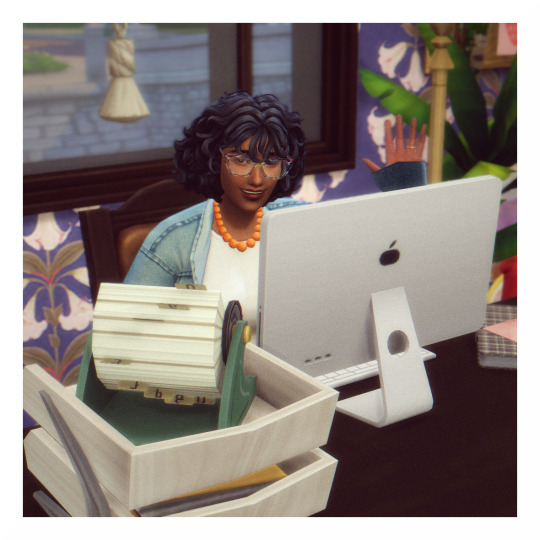

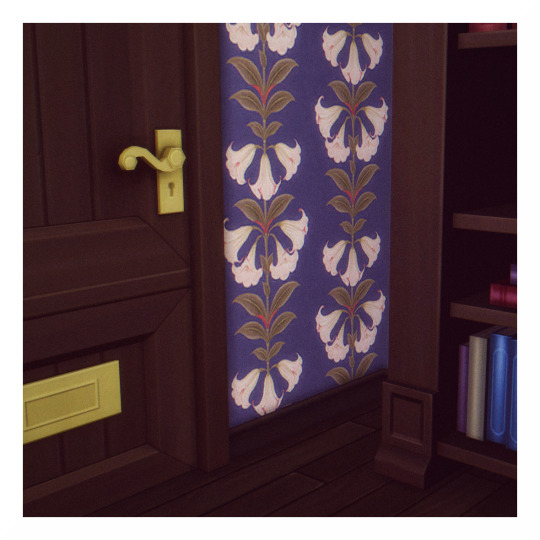

next // previous
july 2, 2021 2:00 p.m. newcrest counseling center
[margot] it’s not what you think. we do not have to dive into family stuff yet, but i have a concern with your current, well, attitude towards opening up about your trauma, and i'd like to introduce you to a bit more theory.
[margot] am i correct in thinking you’re the kind of person who deeply desires an explanation for everything? something nice and neat and zippy that makes sense of things and rationalizes it for you?
[grant] very much so.
[margot] then i'd like to help you explain why you’re so resistant to talking despite you openly wanting to heal. you know that it’s easier in the long run to open up and you feel confident enough to heal, but you are holding yourself back. why?
[grant] because it’s excruciatingly painful?
[margot] it is, but that’s not really getting to the core reason. it’s your reaction to the pain.
[margot] if someone came into this room right now and yelled at you, what would your first instinct be?
[grant] i'd, um, feel very cornered. i'd want to leave.
[margot] when your ex-fiancee cheated on you and she became aggressive, what was your immediate response?
[grant] just to disappear or make myself small, invisible even. i spent the whole time she was in the house after she cheated living in the basement and avoiding her. i'd literally listen for her footsteps and decide whether to come upstairs or something.
[margot] what was your strategy growing up? when your mom mistreated you, what did you do?
[grant] i left or made myself hard to notice. being noticeable got me in trouble. so, i'd do anything to not be in her line of sight or be heard. i'd go to my best friend henry’s house–you know, the guy who unlocked your car the other day–or one of my family member’s houses or my oldest sister’s room. if i had to be home, i wouldn’t ask for anything or make a lot of noise and i didn’t go anywhere my parents were unless it was time for dinner or something.
[margot] do you know the four trauma responses?
[grant] flight, flight, freeze, and fawn?
[margot] yes. those are survival mechanisms. when you’re living in trauma, they’re the ways to keep yourself safe. in your case, you’ve learned to avoid, to disengage, to make yourself scarce. you aren’t naturally that way, but you needed it as a skill because of all the responses, it was the most advantageous. doing anything else meant putting yourself in the line of fire.
[grant] right. fighting would have been the worst choice and i don’t know, freezing just lets people cannibalize me and fawning, i mean, i couldn’t do anything to actually please my parents. even if i did everything right, the problem was just that i existed.
[margot] so, the problem is that the things that kept you safe back then are making your life so much harder than it needs to be now. you’re hurting yourself. you’re stunting yourself even. the longer you stay in that mode, the longer you let it rule you and every interaction you have.
[margot] i know it feels the same way to open up. opening up about your trauma is putting you back into the bullseye because you’re going to relive it, but if you don’t engage with it, what are you doing?
[grant] i'm just putting a band-aid on a gaping wound.
[margot] correct.
[margot] you don’t want to do that.
[grant] no, i don’t. i said last time it’s not what i want. i did it before and the whole nice little house of cards i built for myself came crashing down when i met real resistance in life again.
[grant] also, you said that one time that being cruel to myself is repeating the trauma. this is doing it, too, isn’t it? i'm leaving myself in the same kind of victimized state i was in back then.
[margot] yes, you are. you were a victim, but you don’t have to be anymore. there’s a quote about that i think you should hear.
[margot] “as long as you’re avoiding your feelings, you’re denying reality. and if you try to shut something out and say, “i don’t want to think about it,” i guarantee that you are going to think about it. so invite the feeling in, sit down with it, keep it company. and then decide how long you’re going to hold onto it. because you’re not a fragile little somebody. it’s good to face every reality, to stop fighting and hiding, to remember that a feeling is just a feeling. it’s not your identity.”
#ts4#the sims 4#sims 4#sims 4 story#ts4 screenshots#simblr#hlcn: everything the stars promised#margot <3#this is going to be one of the last times we see margot for a bit#don't worry she's not leaving and grant's not quitting therapy :D it's just time to shift gears in the story again#holocene.docx#holocene.png#hlcn: grant#hlcn: margot
24 notes
·
View notes
Note
I saw ur post about readers past family seeing them again
Angst thought time what if readers past family wasn’t really that great and reader tenses up
OH NOOOOOOO-
okay wait. let’s assume they meet the same way in the village, yeah? so, Reader is probably with Bela and Cassandra and they’re about to walk back to the castle
Reader, of course, still doesn’t know who these people are. they’ve no recollection of them, but upon seeing them and the way they act/call for them, they just… panic for a moment. out of the four trauma responses (fight, flight, freeze, or fawn), they freeze and tense up, eyes wide as their hands begin to shake
Cassandra would probably be the first to notice; she canonically notices the little things about them that others don’t, so she would be able to see their reaction almost immediately. she’d step closer, perhaps step in front of them with her arm out, her other hand reaching for her sickle
Bela would see the way they’ve completely frozen as they stare at these people, and she knows what instinctual fear looks like when she sees it. she’d probably stay on their other side to ensure they’re well-protected and completely out of harm’s way, and if any of their family tries to move toward them, both she and her sister would show off why the Dimitrescu name is so feared
once they’re all back in the safety of the castle, Daniela would probably keep Reader busy and distracted while her sisters… take care of some business in the village. we’ll just say they won’t have to worry about anyone coming to harm them anytime soon :)
5 notes
·
View notes
Text
Date: October 21 2024
Time: 1:40am - MDT
Entry Number: 1
Current Fronter: Emery
Topic: Fear Responses
------------------------------------
Hello! It's currently the dead of night where we live and I can't get to sleep(how fun/s). So I thought I'd talk about fear responses and how we've experienced a giant leap from one to another due to our current situation.
There are four known fear responses. Fight, Flight, Freeze, and Fawn. I won't delve too deep into them but I'll put basic definitions for all of them here-
Fight Response: Responding to threats or fears through verbal or physical defenses/attacks. This can also include feelings of irritation and annoyance towards others behaviors.
Flight Response: Responding to threats or fears by escaping or "running away" from the danger. This may include maladaptive daydreaming, preoccupying ones self with work/school, becoming apathetic or running away.
Freeze Response: Responding to threats or fears by "freezing in place" while still being hyper vigilant about ones surroundings until your brain can make up its mind to fight or flee, however your brain might instead "Flop" or dissociate if it sees it to be the best option(this often happens if you have a dissociative disorder or experience dissociation in general).
Fawn Response: Responding to threats or fears by "neutralizing the threat" through taking care of or pleasing it. This can often be portrayed by taking care of a parent as a child, making yourself as useful as possible, not forming your own identity. Most of these while seen as "helpful" by the casual bystander, can be more harmful than good for those with a Fawn response.
(Resources:
The Beginners Guide to Trauma Responses )
The reason we are bringing this up is because we've recently(within the past year) gone from being in a constant Fawn and Freeze response, to being in a constant Fight and Flight. Which has hit our system like a brick wall.
It's basically the pendulum swinging from one end to the other.
Lately we've been experiencing anger, and annoyance whenever our brain perceives a new "threat". And while this can be helpful in some instances(such as advocating for proper treatment and setting firm boundaries with our loved ones), it can be a hassle in other areas.
For example we've become more irritated when a friend or loved one comes to us with an emotional problem/disturbance, whether the person just had a break-up or their dog died, we've felt annoyed and irritated at them, even when we want to be there. We want to comfort and help how we can. But those feelings of irritation and annoyance arise.
On the other side with the flight response, we've been apathetic, emotionless, and have been maladaptive daydreaming a lot(which has caused a couple of splits).
These feelings and habits arise when our thoughts get too overwhelming. We've gotten to a point where we feel empty, but it's not a painful empty like it was when we were a teenager. It's more of a comfortable empty. You're not bothered with others thoughts or feelings. You're all you have and that's okay, type of empty.
Honestly we were kind of disturbed by the swing from lack of feelings to the overwhelming emotions of anger, irritation, and annoyance, compared to our people pleasing, co-dependant, not knowing what to do in a strenuous situation, self.
In the past we've experienced these feelings(emptiness, extreme anger, irritability, and annoyance), however we've experienced them differently.
Instead of turning on others with our anger and annoyance, it was turned onto ourselves. The same goes for the feelings of emptiness. It was painful to feel that emptiness and we turned on ourselves to relieve it.
It's like someone switched a circuit, causing this phenomenon.
So we decided to talk to our therapist and got her observation on things. And, after some light digging, we figured out that since I've moved and become more independent, situations have arisen where our brain and body has had to be in flight or flight and not freeze and fawn.
From advocating for proper healthcare to escaping our emotions and avoiding conflict with our pushy relatives, it's all been to protect ourselves from these situations that could turn sour in an instance.
For the past year we truly thought we were doing a lot better with our mental health because we've been free of self mutilation for over a year. Because we're able to set good, firm boundaries without too much trouble. Because we're not always waiting for something good to happen to take us away from the trauma.
But it turns out we're just coping differently. We're coping in a way where no one is worried, and we're comfortable with that. Our brain has told us there's no need for others to worry, because we've got our own back.
But the thing is, we still need help. We still need help with groceries, we still rely on government programs to get us through our current life with the multiple disabilities we have. We're still reliant on several people, but our brain's current fear response doesn't understand that. And it's hard dealing with that.
We've had to set boundaries with friends so WE as a system don't ruin the relationship. Because sometimes, those fear responses don't know when to back down and that can ruin relationships and cause more bad than good.
All in all, it's always good to look at yourself and the changes that have happened in yourself, in order to understand what's happening in the moment, especially as someone with a dissociative disorder.
Thanks for getting this far. Feel free to discuss your own experiences and thoughts in the comments! Love Y'all!
-Emery🦊
------------------------------------
-End Entry-
#fear response#fight or flight#dissociative identity disorder#dissociative disorder#hc did#mental health#cptsd#trauma#traumagenic did#diagnosed did#late night post#i'm tired#chronic illness
1 note
·
View note
Text
Effects of Trauma Pt. 1
What is trauma?
Trauma is any experience that poses a threat to someone's physical or emotional safety. We often have certain things we think about when we think of what trauma is (eg: physical/sexual abuse, war), but it can also be other types of abuse, high-crime environments, oppression, bullying, etc. Anything that can make a person feel unsafe can be trauma, although not all those experiences will make someone develop PTSD. Two people who go through the same thing may have different reactions, such as one develops PTSD whereas one doesn't.
Fight, Flight, Fawn, or Freeze?
These are the four trauma responses that are noted in people. Fight and flight are the most commonly known, as they present in other circumstances as well (like in anxiety). They come from the brain's natural desire to survive, causing chemicals in the brain to release (adrenaline is one of them) and pushing you into survival mode. In the fight version of survival mode, you'll try to fight back against the situation (think if you're confronted by a lion, in the fight response, you would try to fight it). Flight is the response where you try to run away from the situation (think running from the lion). Fawn is kind of like trying to appease to the situation, like appeasing to abusers to avoid further abuse. Freeze is when your body/mind freezes, not doing anything to try and prevent it but instead protecting yourself more internally. You can experience multiple of these, and it's likely it'll change based on the situation.
Response Examples
Fight response examples would include: anger outbursts, insulting/mocking/taunting/shaming, becoming aggressive, easily reactive, always feels as though you're threatened, feeling shameful after outbursts, and/or "talking back" to authority figures
Flight response examples would include: chronic rushing or "always going", feeling uncomfortable even when still, energy spent managing things around you, fear of commitment/abruptly ending relationships, easily feeling trapped, making plans to avoid downtime, throwing yourself into work/achievement, being distracted, and/or often presenting as anxiety/panic attacks
Fawn response examples would include: avoiding conflict, going along with others' beliefs (even if not your own), dissociation, letting others make decisions, fearing saying "no", overly polite/agreeable, hyperawareness of others' needs and emotions while betraying your own, and/or relying on others to solve problems
Freeze response examples would include: feeling completely numb, shutdown, complete avoidance, hiding out from the world, procrastination, inability to make even small decisions, endless social media scrolling/binge watching, and/or confusion over what's real and imagined
Disorders caused by trauma
Trauma itself isn't a disorder, but it leads to many. The most commonly known one is PTSD, but there are many more. Depression, anxiety, C-PTSD, substance abuse disorders, somatoform and somatization disorders, eating disorders, psychosis, Acute Stress Disorder, adjustment disorders, Reactive Attachment Disorder, Disinhibited Social Engagement Disorder, personality disorders, dissociative disorders, etc. are all linked to trauma, although not all are only caused by trauma.
Trauma's Effect Years Later
Trauma impacts the ability to identify, regulate, and express emotions and can have a significant impact on the individual's core identity. This is because during those events, the brain doesn't know how to feel. Obviously it feels scared and in need for survival, but there's also hope to survive, anger that it happens, sadness, etc. With all those conflicting emotions at once, the brain gets overwhelmed. This is why dissociation is so common in trauma survivors. We and many other people have noticed that we tend to dissociate more when we're safe, which didn't make sense for the longest time. However, we finally put it together. During trauma, the brain becomes used to being in the high-stress state, so used to it in fact that it sometimes finds the non-stressful things even more stressful. Your brain wants to stick with what it knows, so it feels the peace and safety is a threat.
#did system#osdd system#osdd#did alter#did osdd#dissociative system#osdd support#osdd community#osdd things#trauma#trauma response
56 notes
·
View notes
Text
Trigger Warning: Healing is painful, but there’s so much light on the other side if we’re strong enough to walk through the dark.
My hope in sharing my story is to help anyone who reads it find peace or healing, just as I always aim with my fiction. If it feels right to you to do so, I encourage you to reblog this. It is highly personal, but I choose to share it publicly.
************
This past Sunday, I received an email responding to my desire to withdraw from a fic fest. Instead of the simple “You have been removed from the fest” that I’d been expecting through an official channel from mods to a participant, this is the response I received. Please be aware, the following is painful.
***
We've removed you from the fest and will mark you down as not being welcome to participate in future fests. We show a great deal of compassion toward our writers, which is why we send reminders, answer any and all questions, and provide extensions when requested. There's a reason why our fest has one of the highest numbers of fics of any fest/challenge in the fandom - it's because we support our participating writers and do everything possible to assist them as they complete their fics.
However, once a writer has repeatedly failed to communicate and missed both a deadline and an extended deadline, it's clear that they do not have any respect for the fest, the mods, our time, or our own unique situations, as we don't have endless extra hours to track down participants in a fic fest. Several reminders on three different platforms, an extension, and requests for writers to simply let us know if they need more time does not demonstrate a lack of compassion in any capacity. We also showed a great deal of compassion by welcoming you with open arms into the [redacted] after you insulted the fest, insulted [redacted] fics, and made writers uncomfortable last year after signing up to beta their fics, all while pretending to support and uplift writers in the fandom just as you did in your email here.
Have a great week!
- [redacted] Mods
***
This email arrived right at the end of the night, just as I was lying down to sleep. I couldn’t read it all the way through. It elicited a trauma response in me. My heart started racing, my palms were sweaty, I was shaking, I felt sick to my stomach.
I went into fight/flight/freeze/fawn mode. My first response was to freeze. In order to escape the barrage of pain bombarding me, I simply dissociated and disconnected from my body. It allowed me to sleep, but barely. I deleted the email in a desperate attempt to pretend it didn’t exist.
The pain caught up with me twenty-four hours later. I couldn’t breathe, my lungs shrunk in around my heart. My whole body locked up. I couldn’t move. I knew that if I spoke, even to say ‘hello’ to someone, I’d start crying.
The moment I was alone in my room the tears came. The pain came, bursting through me. I sobbed uncontrollably, curled into myself on my bed, begging for the pain to stop, begging for a miracle, screaming internally for relief and to understand what I’d done to deserve this because I didn’t have the air for more than broken whispers.
I fell asleep whispering ‘I need a miracle’ over and over. The mantra blocked out all the disgusting thoughts that wanted to keep swirling through my head. This is it. This is the final proof that you don’t belong here. You never have. You never will. Run away, M. It’s over. You tried, you failed. You always do. You always will.
I fell asleep out of sheer exhaustion.
Grief is intense. These are the moments where we don’t think we’ll survive what we’re feeling. My love, whoever you are, if you are reading this, hear from me. The agony passed. I needed to feel that agony, to allow it to move through me and to give myself the space to feel it. Without diving off the deep end into what hurts, I wouldn’t have been able to find the inner peace to keep healing, to start to understand.
The residual pain is still there, even as I write this post. But it no longer overwhelms my senses. And by Tuesday morning, I’d been given insight into what was happening.
I experienced a trauma response because it mirrored mistreatment I first received in childhood from family and classmates alike and continued into my adult life. In full view of others, it was acknowledged as cruel even by my mother, who struggles with her own guilt because she never stood up for me. No one did.
So I internalized the mistreatment. I must deserve it if everyone else around me is ok with me being singled out like this? At first I spoke up for myself. But in the end I stopped speaking up for myself too. I had never healed this pain and here it was, coming back around again, forcing me to face it, to heal it once and for all.
I still do not know what exactly I may have said to cause these accusations that you see in the email. **I do not and will not deny them.** Even if my words were taken in a way I did not consciously intend, to deny that I said anything that caused someone else pain is to deny my own power AND to deny that everyone’s emotions are valid and worth digging into.
I have the power to inflict pain, just as I have the power to spread and share love and joy.
Whatever I said came from a place of pain, of believing I did not belong in this community. That I am not good enough or worthy enough to be here. A series of unfortunate but necessary events when I first entered this fandom completely disintegrated my core beliefs in my abilities as a writer, something I have always kept so close to my heart, and my belief that I had a place in this fandom.
I expect, as I look into my past patterns, that what I did was try to logic why I wasn’t allowed to belong. At the time, this fest was the only subset of the fandom I knew, I was so brand new. So I looked through all the prompts in the fest. I brought a scientific method view to answering the question: “What is it about the fics people write in this fandom am I unable/incapable of doing?”
This process allowed me to generalize everything I saw that I perceived as ‘I can’t do that, this is why I don’t belong here’. Consumed in my own doubt that I could measure up and write something worth reading, I dropped from the fest last year too. If I can’t contribute writing that’s worth reading, I could at least stick with what I do best, which is helping others be their best selves. I had signed up to beta, and I chose to cling to the only grasp of belonging I had, which was through beta’ing. I ended up beta’ing four fics last year for the fest. And, of course, each of them were (and still are) incredible fics. At the time, it was further proof to me of exactly what I can’t accomplish.
In all likelihood, these generalizations, stemming from a place of pain and jealousy because I wanted to write good fics too, came out in a personal conversation with someone, which they translated as a personal attack. It is valid. Whoever you are, your emotions are valid. It does not matter how I meant whatever I said, pain is what you felt. This person did not feel comfortable sharing that pain with me, so instead they turned to others and shared. My moment of vulnerability and pain then spread more pain.
Pain only comes from pain.
The response was to shadow ban me. In fact, I was never meant to find out about any of this. The pain this person shared was simply taken at face value and that was that.
So on my end, this decision showed up in the physical world this way: Suddenly all my asks went unanswered, people I tagged to share snippets and last lines and get to know more through ‘about me’ posts or who had once talked to me through DMs simply stopped speaking to me in a way that is only noticeable to the person being ignored. I thought I was going crazy. But there it was, right in front of me: absolute proof that I wasn’t good enough to be a part of this fandom.
Is anyone else beginning to see the cycle of pain?
I expect I continued this cycle right back, because the pain turned to bitterness. I’d been doing everything I could to support every author the best way I knew how, and this was what I got? The exact opposite?
I found out about this shadow ban and actual blocking around June of this year. An ask sent in by a friend for me, inquiring why I couldn’t reblog a post that’d been sent to me by someone else, finally gave me the answer that I’d been banned for the accusations you saw above.
Horrified, hurt, and unable to comprehend any of this except to know that I support every author no matter what they write, I sent an apology to the mods, trying to end this cycle the best I could without knowing any of the details of what had happened. There was nothing more I could do.
They thanked me for the apology, though as you can see from the email, it was never accepted. I do not say that as a judgement call, but simply as a statement of what happened. Everyone is entitled to accept or not accept in their own time and their own ways.
I have been healing so much since everything that occurred last year. And the more I dig in to this cycle, the more my heart goes out to the drafters of this email, to the person I hurt with my words who then turned to share it out of context with others, and to the people who shadow banned me in connection with this situation.
We attract to us what resonates with us. Like attracts like. Which means just as I’ve attracted the greatest friends to me, I have also attracted this pain, and conversely, these mods and that person attracted me to them.
Deep down, on some level we share the same core wounds. And the person who can really understand just how painful those wounds can be is someone who feels them too.
So this is my message to the mods of the above email, to those who have shadow banned me and want nothing to do with me, and to the original person I hurt with my words:
I am sorry for my part in this pain. I am sorry for causing pain and I apologize for it. You are loved. You are enough. You are doing a fantastic job. Your feelings are valid. Your hurt is valid. I don’t know what occurred that hurt you before I entered the fandom, but after finding out from others that an email like the one you sent above is ‘Oh that’s just how they are’ tells me something else happened to hurt you before I even arrived.
Your hurt then is valid too. Allow yourself to feel it and process it. Don’t let it consume you. Don’t let that hurt and fear of it happening again or believing that that’s how everyone is push away from you people who in fact love just what you love. If someone has a different belief from yours, don’t let it invalidate what is true for you. Believing internalized lies about myself only caused me pain. And we spread and create what we believe to be true, whether we consciously realize it or not.
So here, now, is my truth:
I choose to perpetuate love. I choose to spread love. I choose to understand my pain and the pain of others, to transmute it, and to heal it, instead of passing that pain on.
I choose compassion. Compassion for myself in making these mistakes, and compassion for those who have hurt me. I do not condone the email that was sent to me. No one deserves to be treated that way. I choose to focus beneath the visceral anger and lashing out, to focus on the agony beneath the words, and stop this cycle of pain.
I choose to belong in this fandom. I choose to support every author in this fandom and ensure no one ever feels not good enough. I choose to own my past mistakes and learn from them.
I choose trust. To trust that those who I truly hope will see this, will see it. I have no expectations of responses or outcomes or reactions. My only hope is that whoever will benefit from seeing this post will see it.
This is not a matter of right or wrong, bad or good, just or unjust. It is a situation of two parties in pain, triggered by the same triggers.
Looking back on that email, I’ve come to realize that half of the pain I felt when I received it was not my own. I felt the pain of the attack, sure, but I also felt the immense pain beneath those words. And I wish I could hug you. I acknowledge your pain and I acknowledge how painful it is because I know that pain myself. I also know that this pain isn’t you and it isn’t who you are.
So I choose to remember the mods I first met around this same time last year in this same email chain. Mods who were so kind and offered advice to a brand new writer even when she sent an email that had nothing to do with the fest and was still struggling to find her place in the fandom. I choose to remember how beautiful that kindness felt. I choose to remember how I was so grateful for that kindness that I shared my gratitude for these same mods in an email with with another fandom friend at the time. I am still grateful for you.
You are so loved. You are loved for being exactly who you are. This fandom is built upon love. A shared love of five incredibly talented lads who have brought so much joy and light when each and every one of us has needed it the most. Shine your light through the dark and believe with all your heart that you are not alone. You have support. I support you. Shine on. Don’t let anyone dim it.
#Being this vulnerable#is an act of courage#I never knew I had#I'm not fearless#I feel ready to vomit#I have no idea how this will be received#but I am sharing my truth#have courage to share your truth#the world needs you
88 notes
·
View notes